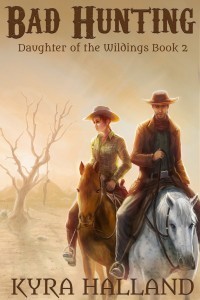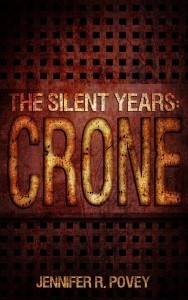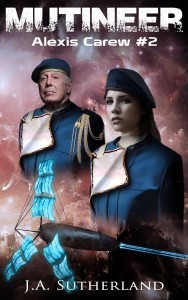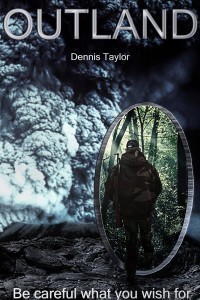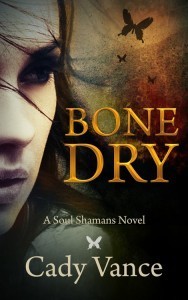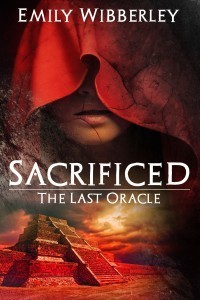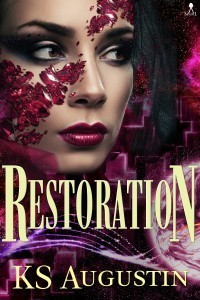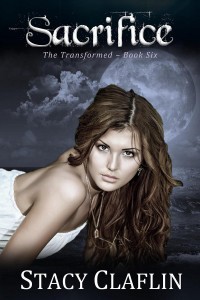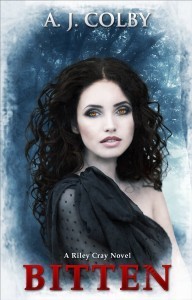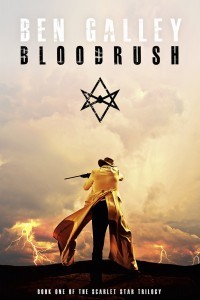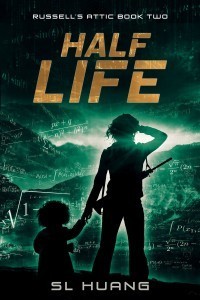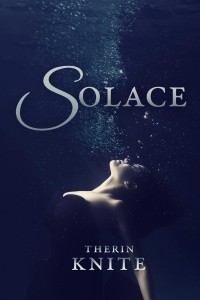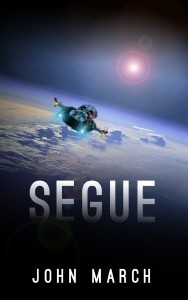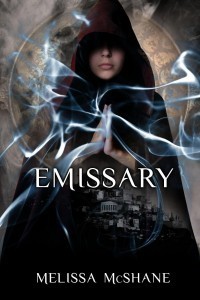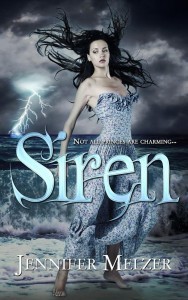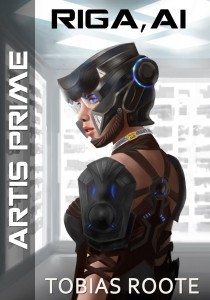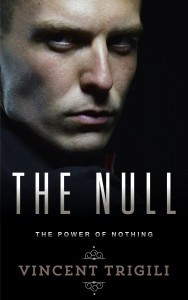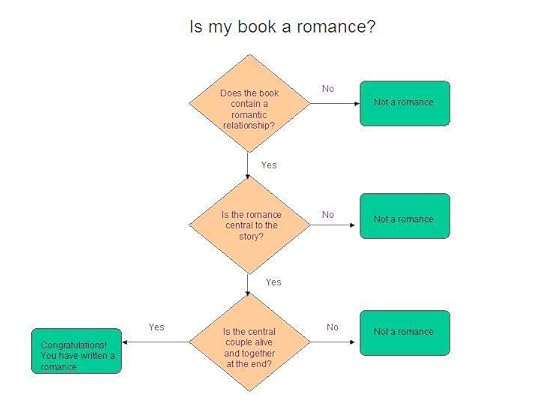Cora Buhlert's Blog, page 109
February 27, 2015
Indie Speculative Fiction of the Month for Feburary 2015
 It’s that time of the month again, time for “Indie Speculative Fiction of the Month”.
It’s that time of the month again, time for “Indie Speculative Fiction of the Month”.
So what is “Indie Speculative Fiction of the Month”? It’s a round-up of speculative fiction by indie authors newly published this month, though some January books I missed the last time around snuck in as well. The books are arranged in alphabetical order by author. So far, most links only go to Amazon.com, though I may add other retailers for future editions.
Once again, we have new releases covering the whole broad spectrum of speculative fiction. We have hard science fiction, military science fiction, space opera, science fiction romance, paranormal romance, dystopian fiction, post-apocalyptic fiction, horror, weird western, epic fantasy, urban fantasy, young adult fantasy, werewolves, vampires, witches, dragons, ghosts, djinns, magic schools, pirate airships, monkey queens, demon hunters, repentant assassins, erupting super-volcanoes and much more.
Don’t forget that Indie Speculative Fiction of the Month is also crossposted to the Speculative Fiction Showcase, a group blog run by Jessica Rydill and myself, which features new release spotlights, guest posts, interviews and link round-ups regarding all things speculative fiction several times per week.
As always, I know the authors at least vaguely, but I haven’t read all of the books, so Caveat emptor.
And now on to the books without further ado:
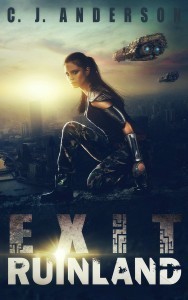 Exit Ruinland by C.J. Anderson
Exit Ruinland by C.J. Anderson
2131: PREPARE FOR WAR
Beautiful and impoverished, Lauren Vasquez joined the United States military in her youth. She never expected to witness the destruction of Earth. In the year 2131, nuclear and chemical war fueled by religion obliterates all of civilization. Trapped in underground bunkers Lauren and other survivors face homicidal artificial intelligence and fabricated metal assassins who police their new dystopian reality. An unplanned pregnancy by a sociopath further complicates her situation and Lauren will do whatever it takes to protect her unborn child. She holds on to the dream that her baby will not be formed with the emptiness of the father. Explore a possible future of human and synthetic beings as Vasquez enters, survives, and fights to find an exit from the ruined land. You will question the origin of life and embrace the dreams of androids. This is a powerful story about the mystery of love, the finality of death, and the struggle to find hope in a devastated world. Exit Ruinland contains the first four books in the Ruinland series.
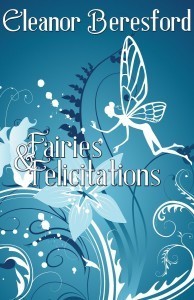 Fairies and Felicitations by Eleanor Beresford
Fairies and Felicitations by Eleanor Beresford
Anne has always thought of herself as middling. Middling looks, middling position in the form, middling magical Gift and just a middling curve to the tip of her ears.
Her best friend, Lady Emmeline Eversleigh, commonly known as Kitty, is not middling anything. And when Kitty drags Anne into playing a Saint Valentine’s Day prank of truly wicked–and magical–proportions on one of the prefects, Anne finds herself in more than a middling muddle of trouble.
A stand alone novelette of 10,000 words in the Sorcery and Scholars series.
 The In-Betweener by Ann Christy
The In-Betweener by Ann Christy
Two years ago a new medical nanite advance divided humanity into three types: humans, deaders and the frightening in-betweeners that crave human flesh. Emily’s world has grown quiet and ordered, her day bounded by mornings killing deaders at her fence and nights huddled alone in a warehouse office. She’s begun to believe life will always be this way, alone with the dead or fighting in-betweeners for her life. But even that life is better than the alternative.
Everything changes when one of the deaders at the gate isn’t a deader at all. He’s an in-betweener different from any Emily has seen before…and he has a message.
The In-Betweener is book one of the Between Life and Death series. Book two, Forever Between, will release in March 2015. Book three, Between Life and Death, is scheduled for release in May 2015.
The Between Life and Death series is suitable for ages 16 and up, with occasional violence and mild language.
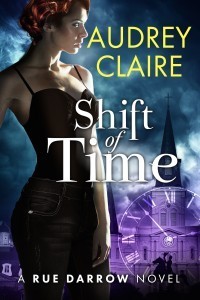 Shift of Time by Audrey Claire
Shift of Time by Audrey Claire
Rue Darrow is a newly made vampire, and she’s alone in New Orleans, no boyfriend, no son, and no friends. All she sees is an eternity spent working at menial jobs just to pay the bills, hunting where it’s safe, and holding onto the her flagging human emotions.
Then Rue saves the life of a man in a dark alley. What she didn’t realize was the man was Fae, and the attackers were demons. The grateful Fae wants to hire Rue to get back a treasure that was stolen from him, but he won’t tell her what it is. Rue, who has never been in a fight in her life–before the alley scuffle–is thrust into a new, darker world where there are not only Fae but werewolves, demons, unidentified creatures, and even her old “buddy” Death.
Rue’s not sure if she should take on the job, but well, it beats shift work.
Lieutenant Callum Harper hadn’t intended on punching his commanding officer quite so hard. But maybe it wasn’t such a bad turn of events. Court-martialed and dumped on a reject raft bound for Earth, Cal feels optimistic about a life where getting blown up, shot, or even eaten is altogether less of a concern. And, more importantly, a life where the only person he’s responsible for is himself.
Unfortunately, fate doesn’t favour the mundane. Crash-landing on a lethal planet, and with technology failing all around him, Cal must take his fellow passengers under his wing in order to survive and unravel the reasons behind their situation.
But the cause is far worse than any of them could have imagined, for theirs is a small part of a much larger crisis. Colonized space is under attack. Humanity is on the verge of chaos. And those who enjoy such anarchy are already beginning to thrive.
Yet Cal and his new companions will discover that mankind isn’t the true threat” – not by a long shot.
 Under the Stars of Faerie by Robert Dahlen
Under the Stars of Faerie by Robert Dahlen
“You were right about her. She is a hero.”
When a love-crazed gremlin kidnaps pixie waitress Mandy, Michiko Koyama, a.k.a. the Monkey Queen, and her partner in adventure Beth McGill journey to Faerie to rescue their friend. Circumstances force them to ally with the crew of a pirate airship, led by the mysterious Captain Ash. Dangers await them in the sky, on the ground and in their hearts.
And an old enemy waits for them, his trap set and ready to be sprung…and it could mean the end of the Monkey Queen.
This is book 3 of the Monkey Queen series.
 The Family Business by Marina Finlayson
The Family Business by Marina Finlayson
Renardo and his brothers are up to their eyeballs in debt, with one last chance to save their merchant business (and their gonads) from the moneylender. The great city of Tebos is holding its Festival of Song in three days’ time, and they have a wagonload of songbirds to sell.
There’s just one large, man-eating problem: the bored sphinx who guards the city’s gates, and her deadly riddle game. Renardo doesn’t even want to be a merchant, but somehow it falls to him to outwit the sphinx. No pressure. All he has to do is come up with an unanswerable riddle.
A short story (4,000 words) for lovers of humorous fantasy.
When Shannon wakes up in the middle of a forest, confused and disoriented from her sudden and unexpected death, she follows a path that leads to a small, dilapidated town full of silent spirits who repeat the same tasks over and over again, completely unaware of their surroundings. And the worst part? She might be trapped there forever.
She’s alone and terrified until she runs into Ben, a charming but cautious man from Victorian England who’s been trapped in the town since his death in 1894. He tells her she’s the only person who’s spoken to him since he arrived. With his experience and her creativity, will they be able to find a way out of the town and into a better afterlife?
“The Gate” is the beginning of an emotional and haunting story that depicts a budding romance between two people who never met in life, and can only be united in death.
This is Part 1 of a series of novelettes, and is approximately 9,000 words.
Cowboys and gunslingers meet wizards in this high fantasy series inspired by the American Wild West. Silas Vendine is a mage and bounty hunter, on the hunt for renegade mages. He’s also a freedom fighter, sworn to protect the non-magical people of the Wildings from ambitious mages both lawless and lawful. In his line of work, Silas knows to expect the unexpected, but he never expected to end up with a partner like Lainie Banfrey, a young woman born in the Wildings who is both drawn to and terrified of her own developing magical powers.
Silas and Lainie have defeated the dangerous rogue mage who brought Lainie’s hometown to the brink of open warfare. But the town of Bitterbush Springs isn’t big enough for two wizards, or even one, so they’ve hit the trail. Then Silas gets word that another mage hunter down in the dry and desolate Bads is onto something big and needs backup. He and Lainie head into the badlands only to find one mage hunter dead and another one missing… And Silas could be next.
This is book 2 of Daughter of the Wildings, following Beneath the Canyons.
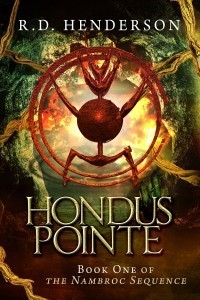 Hondus Pointe by R.D. Henderson
Hondus Pointe by R.D. Henderson
The first book in a fantasy novella series takes place in the Nether Realm featuring a cadre of rogue black elven intelligence operatives believing black elves should return to the surface to rule the Earth Realm like they did nearly two thousand years ago.
Author’s Note: The word count is 30,043.
 Rynlee’s Song by Eliza Marie Jones
Rynlee’s Song by Eliza Marie Jones
Rynlee Nalis is a demon hunter. She is a Purator, belonging to an organization who slay demons to serve their King. Even though she’s a candidate to succeed the High Purator, eighteen-year-old Rynlee doesn’t want the responsibility.
Her entire world is turned upside down when Jeynen shows up at the temple that is her school and home. She thought he died five years ago.
And he has no idea who she is.
When an assassin comes for Jeynen and he manages to flee for his life, Rynlee rushes after him. As she tries to discover the truth about him, she stumbles onto an ancient prophecy and challenges those who want to destroy the balance of magic.
At the request of an agent of the Crown, Tyrnill helps investigate a series of unexplained deaths.
This is a novella length sequel to SongHealer.
Carus is only fifteen but since their mum disappeared, looking after her little sister Mitch is her job. There’s nobody else. Not in their house and not outside, either. There’s something out there, scratching and scraping at the windows.
The barricades will hold.
They have to.
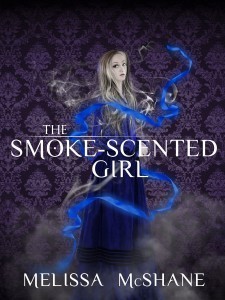 The Smoke-Scented Girl by Melissa McShane
The Smoke-Scented Girl by Melissa McShane
In a world very much like our own Victorian England, the country of Dalanine is at war. The implacable, unstoppable Despot has been pushing northward for over a year, conquering everything in his path with military and magical force, leaving nothing but destruction in his wake. For Evon Lorantis, Dalanine’s most promising young magician, the war represents the same kind of work he’s always done, inventing and developing new spells for his country’s defense. But as good as he is, he’s still stumped by the mystery the government’s department of Home Defense brings him: a rash of spontaneously occurring fires, hotter than any natural force can produce, melting stone and vaporizing flesh wherever they strike. Home Defense believes it’s a weapon that will finally defeat the Despot. And they want Evon to harness it.
In investigating the problem, Evon discovers these fires are no accident; there’s a magician behind them, a woman using the fire to prosecute justice on her own terms. Evon sets off on a journey across Dalanine to track down this rogue magician, hoping to persuade her to turn aside from her vigilante crusade to serve her country, afraid of finding only a madwoman at the end of his quest. But the woman he does find is nothing like he expected, the mystery far greater—and older—than he’d imagined, and the secret of the fire more potent than anyone could have guessed. As Evon attempts to untangle fact from myth, what began as an assignment becomes a challenge that will require every ounce of magical ability he has—and will irrevocably change the course of his life.
It began as a fever of unknown origin that its victims dubbed “the Heat,” but as it burned through most of the world’s population, it became known simply as “the Dying.” And for those left behind, the struggle has just begun….
In the aftermath of the Dying, survivor Jessica Monroe is protected and guided by the gentle voice of an invisible being she thinks of as her guardian angel. When she reaches the sanctuary he’s provided for her, however, she realizes that her unseen companion is no angel at all. The destruction of humanity was only the first step in a much larger plan, and now Jessica must struggle to discover her own role in a frightening new world where everything has changed.
Bruton is a community struggling to survive – and to retain some of the values of the old world. Led by tough former lawyer Helen Locke, it’s a small town where people struggle to remain civilized, to keep their technology and to survive. Until Tom Milkins shows up – and Locke knows he’s trouble right away. When a young scout is brutally murdered, it’s clear that Bruton – and Locke – might have more than they bargained for. Can they keep the light of civilization in a world full of wild children and dangerous, patriarchal men?
This is part 2 of the Silent Years series and the sequel to Mother.
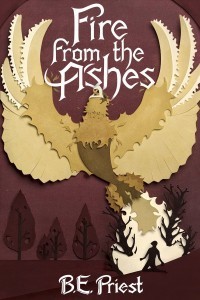 Fire from the Ashes by B.E. Priest
Fire from the Ashes by B.E. Priest
A DRAGON IS BORN
“Come, Little Dragon. The sun rises, and so must you.”
The Scion King sits Riverdale’s throne.
Rebels mass near the Western Sea.
Having lost everything,
Asher flees to the edge of the broken realm,
where he must find redemption
or die alone.
Book 5 in the Southwind Knights series.
Ships are disappearing in subspace. Traders, rebels, pirates, and even military vessels are losing their way in the Big Nothing that makes space travel possible. Deep-cover agent Sethran Kada joins the investigation after his own navigator, Ciela, barely escapes the void with her mind intact. It soon becomes clear that this subspace trap is more than some natural phenomenon,
Seth’s search for answers leads him to a brutal penal colony on the brink of revolt, and uncovers a plot to destroy an entire planet. When evidence points to the return of the dangerous subspace entities known as Dyads, Air Command mobilizes to annihilate the threat at any cost.
Seth and Ciela pursue a Dyad who has infiltrated a key research complex where they discover that the inexorable subspace peril will not just threaten a single planet. It will mean the end of interstellar travel and destroy their Commonwealth civilization.
This is book 3 in the Targon Tales – Sethran series.
“What we have here is a very high-quality junkie novel that happens to be about a unique case of vampirism.” —Evan Clark, author of Movers
WHEN WORN-OUT MUSICIAN DAN FERRY decides to take a shortcut back to the band’s hotel, he picks the wrong dark alley to go down. Within days of being attacked by a bat-like creature, he becomes consumed with the need to drink human blood. Terrified of what will happen if he doesn’t get his fix–and terrified of what he’ll do to get it–he turns to his best friend and bandmate, Ray Ford, for help. But what the two don’t know as they try to keep Dan’s situation quiet is that the parasite driving Dan’s addiction has the potential to wipe out humankind.
Poignant and terrifying, heartfelt and ingenious, Suckers is a story of sacrifice and friendship in the face of an alien contagion that threatens to destroy humanity.
 Finding Faded Light by Jarrett Rush
Finding Faded Light by Jarrett Rush
The government has collapsed, RomaCorp is rising in its place, and Weber Rexall threw the first punch in a fight with Roma that he and his friends weren’t ready to finish. With Roma looking for him, he’s fled New Eden for the Outer West, hoping to give his friends time to prepare for an inevitable second round. He just never expected that to take two years.
Scratching out a new life far from home, Rexall thought he had longer to stay out of Roma’s reach. But with a hefty reward on his head, desperate thugs are eager to turn him in, and a relentless Roma security agent he knows all too well has come to bring him back.
Rexall could run again, but RomaCorp won’t stop unless he can finish the fight he started. Yet to do that, he needs more help and resources than the Outer West can offer–and if he fails a second time, there won’t be a third.
This is book 2 of the New Eden Series/Rexall Cycle, following Chasing Filthy Lucre.
 My Partner and Me by Hollis Shiloh
My Partner and Me by Hollis Shiloh
Being mates makes everything perfect—doesn’t it?
Sean is happy with his mate, Tom. As far as he’s concerned, life is golden. Except for when it isn’t. Their work is dangerous. While Sean’s recovering from his most recent injury, he hears a little girl in his head, calling for help. And his wolf side is acting up: too sensitive, too vulnerable. He needs Tom more than ever, especially when it means facing his family and old wounds. Even if things are never truly right for his wolf side, at least he has a mate who will never leave him…right?
Takes place after My Partner the Wolf
89,000 words. Some angst. Some wolf stuff. Lots of love. Happy ending. (I promise!)
Sexiness level: Medium-ish
Just as Midshipman Alexis Carew thinks she’s found a place in the Royal Navy, she’s transferred aboard H.M.S. Hermione. Her captain is a Tartar, free with the cat o’ nine tails and who thinks girls have no place aboard ship. The other midshipmen in the berth are no better. The only advice she’s offered is to keep her head down and mouth shut – things Alexis is rarely able to do.
This is the sequel to Into the Dark.
When the Yellowstone supervolcano erupts, it’s up to six university students and their experimental physics project to prevent the end of civilization.
When an experiment to study quantum uncertainty goes spectacularly wrong, physics student Richard and his friends find that they have accidentally created an inter-dimensional portal. They connect to an alternate Earth with identical geology, but where humans never evolved. They go panning for gold and become millionaires overnight, while fantasizing about Nobel Prizes and patents.
Then the Yellowstone supervolcano erupts on Earth in an explosion large enough to destroy civilization and kill half the planet. Richard and his friends have less than an afternoon to get as many people as possible across to Outland before Nebraska is covered in a lethal cloud of ash.
Now Richard finds himself in charge of a disorganized and frightened band of reluctant pioneers, on a world with none of the modern infrastructure that people have come to depend on. Richard has been a loner all his life, and has always wanted to be part of something bigger– but this is far more than he bargained for. If he doesn’t get this right, it’s not just the lives of the people in his care that could be lost– it may very well be the end of human civilization.
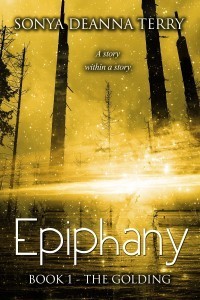 Epiphany – The Golding by Sonya Deanna Terry
Epiphany – The Golding by Sonya Deanna Terry
A MYSTICAL FOREST
AN ANCIENT PROPHECY
A LOVE THAT SPANS LIFETIMES
First in the two-volume Epiphany series, The Golding is a captivating story-within-a-story that alternates between the work of an 18th-century author and the present-day lives of those who study his book.
Rosetta Melki, part-time tarot reader, struggling sole parent and full-time idealist, begins a reading group to examine a fantasy novel, and discovers the book to be anything but fiction.
The book, written in the 1770s by Edward Lillibridge, is a hidden history that reveals the true beginnings of the global monetary system. Lillibridge’s tale surrounds ancients from a gold-obsessed empire and the sprites they oppress: intuitive clan dwellers whose currency of choice is kindness.
Whether discontent in rich and poor alike will ever make way for the Currency of Kindness, whether anyone can believe enough in humanity’s true ancient history to activate the dawn of a benevolent new era, remains to be seen, but the time-crossing sprites of Lillibridge’s descriptions have set their sights on Rosetta. Their attempts at providing a companion to assist in the quest they have planned for her leads to a clumsy introduction to Matthew Weissler, a feet-on-the-ground finance executive who is disturbed to find he’s being followed by an elf.
It would seem Matthew and Rosetta have nothing in common, and yet the sprites believe if the two work together, a renaissance known as The Silvering will occur. But someone from the empire of the past is intent on preserving Earth’s pattern of pain, and is determined to prevent the sprites from succeeding.
Sixteen-year-old Holly Bennett is a comic book nerd, a con artist, and a shaman. Ever since her mom’s mind got stuck halfway between the spirit world and ours, Holly’s been forced to act as the breadwinner of the family. She uses her burgeoning shaman powers to set up fake hauntings and “banish” the so-called ghosts from her wealthy classmates’ bedrooms. For a fee, of course.
But when actual spirits start manifesting, Holly discovers that other shamans have come to town, summoning life-sucking spirits for their own ends. And as her mom’s mind slips further away, Holly has to fight to save her, and the rest of the town, before they get sucked into Lower World permanently.
Fifteen-year-old Clio should have never been the Oracle of Sheehan. That power is passed from mother to eldest daughter, and Clio is the youngest of four sisters. But when her entire family is murdered by Mannix, the king’s adviser, Clio is left all alone and heir to a power she never wanted and doesn’t understand.
Hunted by Mannix, Clio seeks refuge in a foreign city where oracles are absolutely forbidden. If she’s found out, she will be sacrificed atop its great pyramid.
Clio has no choice but to win the trust of Riece, an enemy warrior. Despite the growing feelings between them, Clio knows that if he finds out who she really is, he won’t hesitate to kill her.
Clio tries to hide her budding powers, longing to be a normal girl who can fall in love, but the visions she has of Mannix bringing a barbarian army into Sheehan torture her conscience. She alone has the strength and foresight to stop him, but only if she can embrace her destiny and sacrifice everything.
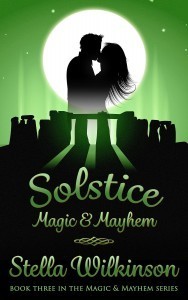 Solstice Magic & Mayhem by Stella Wilkinson
Solstice Magic & Mayhem by Stella Wilkinson
It’s the Summer Solstice and it’s a full moon too. Natural Witch Emily Rand has been doing her best to keep her distance from gorgeous Werewolf Aaron Fletcher, but fate has other plans. Fletch’s new pack Alpha has heard of Emily’s powers and is coming for her. He wants to bond his wolf to her witch and make himself the most powerful Werewolf in Britain. Can Emily and Fletch combine forces to outsmart the Alpha before the Solstice magic takes away their choice? Emily has never had great control over her powers and being forced into a battle to stop the Alpha can only result in complete mayhem.
A humorous paranormal romance. Book Three in the Magic & Mayhem series.
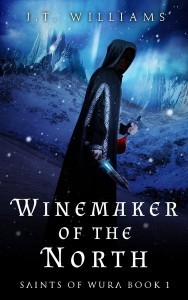 Winemaker of the North by J.T. Williams
Winemaker of the North by J.T. Williams
Sviska is an assassin questioning the sanctity of his lifetime of bloodshed in service to an ancient sect. Perceiving their acts have become random and senseless, he refuses to murder a young child. He wishes to leave his life with the Order, but they have another assignment for him and if he refuses this too, he will be killed.
Sent to an isolated mountain city called Elinathrond, Sviska finds a place where a plague is rampant; a wine used to prevent the ailment has run out. Sviska’s task is to ferment a medicinal wine for the people and it is here he discovers that magic, an extinct force in his lands, is very much alive. But why the Order would send him here to procure this life saving elixir for those they wish dead, confuses him.
In this last refuge for magical peoples, a weakening spell exposes more of them to the sickness with every moment. Rumors are spreading that the city is no longer safe, and a malicious evil is growing beneath the streets. If he fails to procure the wine, Elinathrond faces desolation, but the death of the last winemaker was no accident, and Sviska may be next.
 Send to Kindle
Send to Kindle
February 25, 2015
Some reactions to the jabs against superhero movies at the Oscars
In my Oscar reactions post, I already addressed the jabs against superhero movies during the ceremony and explained why they sat badly with me. Hell, even Birdman winning the Oscar for best picture can be seen as a slam against superhero movies, since it’s a movie about an actor who used to star in a popular superhero franchise, starring three actors who used to be in popular superhero franchises, trying to make a comeback with a serious Broadway role and yet being haunted by his superheroic past.
It seems I wasn’t the only person who had that reaction, because in the past few days several posts and articles have popped up commenting on why the Oscars seem to hate science fiction and superhero movies, a question posed by Entertainment Monthly.
Hence, the International Business Times points out that the Oscars are biassed against science fiction, fantasy and horror films as well as foreign language films. Even worse, non-English-language that are massive successes around the world such as Run, Lola, Run, Good-Bye, Lenin, The Intouchables, Monsieur Claude and his Daughters as well as any number of Indian, Chinese, Japanese and Korean films are regularly snubbed even in the foreign language category. Apparently, playing very ill or disabled people only nets you an Oscar, if you’re American or British, as Francois Cluzet and Katrin Sass can attest.
And should a science fiction, fantasy or horror movie manage to win any Oscars in one of the prestigious categories, critics and cultural pundits usually view it as a sign that the world is about to end and that Hollywood has fallen to the barbarians. View the reactions to the many Oscars won by The Return of the King (which even took best picture, the only SFF film ever to do so), Avatar and Gravity. View the reaction to Silence of the Lambs, a horror movie, becoming only the third movie ever to win the quintuple, i.e. best film, best actor, best actress, best director and best screenplay (the other two were Frank Capra’s It Happened One Night in 1935 and One Flew Over the Cuckoo’s Nest in 1976 BTW). View the reactions to Kathy Bates winning an Oscar for Misery (“She’s old. And fat. And won for a horror movie.” – Yeah, cause she was amazing). I guess Heath Ledger was only spared those reactions when he won for his marvellous portrayal of the Joker in The Dark Knight (and for the record, I don’t even like that movie), because he was dead by the time he won the award and besides, it’s kind of obvious that his posthumous win for The Dark Knight was an attempt to make up for the snub for Brokeback Mountain earlier.
The Wrap makes a point I made as well, namely that slams against superhero movies look kind of hypocritical when many present and past Oscar winners and nominees have appeared in such movies. Also kudos for remembering that J.K. Simmons used to play J. Jonah Jameson, that Felicity Jones was Felicia Hardy and Marion Cotillard was Talia al Ghul and that Benedict Cumberbatch will soon be Doctor Strange. Oh yes, and apparently Viola Davis is in the running for the role of Amanda Waller in Suicide Squad now, which makes me happy, because I find her so much more suitable for the part than Oprah Winfrey of all people.
Meanwhile, James Gunn, director of Guardians of the Galaxy, points out that he didn’t feel offended by those remarks but resents the implication that directors of superhero movies and other big budget spectaculars put less care into their films than directors of arty indie fare. There’s also a nice little counterjab against Dan Gilroy, who apparently made disparaging remarks about a “tsunami of superhero movies” at the Independent Spirit Awards, when Gunn points out that Gilroy’s wife Rene Russo actually played Frigga in the two Thor movies (and was great in the role, too, particularly in The Dark World), so stones and glasshouses and all that.
Blastr comments on James Gunn’s comments and adds a few of their own.
If the Academy was merely biassed against entertainment movies, the snubs against SFF movies might be more bearable. But it simply isn’t true that the Academy only awards adventurous arthouse movies, because it doesn’t (never mind that some SFF and comic book movies are artistically adventurous such as Sin City or From Dusk Till Dawn or Under the Skin or Only Lovers Left Alive). For every Boyhood and Birdman, which tries to do something different artistically, there are lots conventional biopics and sick people dramas and bloated historical epics and propaganda epics that don’t do anything we haven’t seen a thousand times before in the past eighty years. Nor does the Academy hate fluffy entertainment as the many wins for musicals even in the best picture category over the years attest. Ditto for tearjerking melodramas, which frequently win as well in spite of being blatantly manipulative. I mean, in what world is Titanic a better movie than Aliens or the first two Terminators or even Avatar? In what world is Chicago a better film than The Two Towers? In what world is Annie Hall a better film than either Star Wars or Close Encounters of the Third Kind?
In many ways, the Oscars have never moved on since the 1930s. Studios are still producing a lot of what they deem “popular trash for the masses” to finance the prestigious Oscar-bait pictures, the biographies of “great men” (and they’re still overwhelmingly men), the blatant propaganda flicks disguised as high art, the tearjerking melodramas about people being ill or dying in dramatic ways. And in twenty or fifty or eighty years, film fans will react to those choices just as we do to the Oscar winners of the 1930s. “What do you mean, Eddie Redmayne won his Oscar for The Imitation Game rather than Jupiter Ascending?” – “They could have awarded the 2012 Oscar for best picture to The Avengers and instead they chose Argo? What the fuck is Argo anyway?” – “Slumdog Millionaire honestly won best picture instead of The Dark Knight, which wasn’t even nominated?”
 Send to Kindle
Send to Kindle
February 24, 2015
Some Reflections on the 2015 Oscars
Yes, it’s the annual Oscar post. And yes, I did watch, even though I had little interest in any of the nominated films. In fact, I was considering going to bed all the way through the endless red carpet interviews. In fact, the only reason I didn’t go to bed was that I wanted to see the opening number. “I’ll go to bed afterwards”, I thought. But by the time “afterwards” rolled around, my peak fatigue had passed and I held out until the end.
So how was it? Better than I thought it would be, given I don’t really like any of the nominated films. Let’s start with the host. Neil Patrick Harris was probably the best Oscar host we’ve seen in the past five years or so. He’s a fine singer and dancer and looks good both in a tuxedo and white briefs, his jokes were pointed, but didn’t go under the belt too often, he managed not to ask Clint Eastwood why he didn’t just go and die already, which Steve Martin did a couple of years ago, he didn’t sing about anybody’s boobs like Seth MacFarlane in 2013. In short, he was a pretty damn good Oscar host, though I still prefer Hugh Jackman, who hosted in 2009, if only because seeing Hugh Jackman exclaiming “I am Wolverine” on the Oscar stage is still a tad cooler than watching Neil Patrick Harris dance with a ballet of Stormtroopers (and Roman legionaires and modern day soldiers and 1930s style chorus girls).
In general, the musical numbers were less annoying than in previous years. For once, only one of the five nominated songs was terrible, the decidedly NOT awesome “Everything is awesome” song from the inexplicably popular Lego Movie. All the other nominated songs were pretty good, as was Jennifer Hudson’s song during the “In Memoriam” segment. On the other hand, I had to mute the sound during Lady Gaga’s tribute to The Sound of Music. Not because of Lady Gaga’s singing skills, because she can actually sing, once you look beyond the performance and the weird gowns, but because I absolutely cannot abide The Sound of Music.
I first read about The Sound of Music as a teen in a coffee table book on great movies, which I’d bought at a used book store in Rotterdam. At the time the book was published (1980), The Sound of Music was the third highest grossing movie of all time after Star Wars and Gone with the Wind. However, I’d not only never seen said movie, no I’d never even heard of it. Which was strange, because if a film was the third highest grossing movie of all time, you’d expect to at least have heard of it. Luckily, the book had a page or two on the film, so I read it and thought, “Wait a minute, I know that story. That’s Die Trapp Familie. Only that the actors are all wrong.”
It turned out that The Sound of Music is a remake of the German movie Die Trapp Familie (The Trapp Family) from 1956, starring Ruth Leuwerik and Hans Holt. The German original is a classic in Germany, frequently on TV, usually around the holidays, and even begot a sequel, Die Trapp Familie in Amerika (The Trapp Family in America) two years later. Meanwhile, The Sound of Music is little known and almost never seen in Germany. Eventually, I did see the Hollywood version in England and immediately understood why it’s hardly ever shown in Germany. Because not only is The Sound of Music an almost shot by shot copy of Die Trapp Familie in many parts, the music is also incredibly grating and doesn’t fit the time and place at all compared to the traditional songs in the original. So having grown up with The Trapp Family, I simply cannot abide The Sound of Music. If you ever want to watch the original, it’s on YouTube with English subtitles even. Look out for the various people of colour in the background in the “arrival in America” segment near the end.
Talking of which, I also found it heartening that the Academy apparently decided to make up for the appalling lack of diversity among the nominees by putting a lot of people of colour on stage as presenters. Hence we got Lupita Nyong’o, Viola Davis, Octavia Spencer, Idris Elba, Chiwetel Ejiofor, David Oyelowo, Zoe Saldana, Dwayne Johnson, Terrence Howard, Oprah Winfrey and Jennifer Lopez presenting as well as Jennifer Hudson singing in the “In Memoriam” segment. There might also be one or two actors of colour I’ve forgotten. Neil Patrick Harris also made a couple of jokes about the overwhelming whiteness of the oscars. Of course, it would be much better if the Academy could actually nominate some people of colour next year rather than having them hand Oscars to overwhelmingly white winners. There were a couple of winners of colour in the end, including Harry Belafonte winning a lifetime achievement award (which thrilled my Mom, cause she’s a massive fan) but that doesn’t make up for an overwhelmingly white field of nominees either.
In general, I often found myself liking the presenters a lot better than the people who actually won the awards. There were quite a few moments where I thought, “Hey, why isn’t he or she nominated tonight?”
It’s also interesting that 2015 saw a much higher incidence of more or less political acceptance speeches than before. Patricia Arquette, winner for best supporting actress, called for equal rights and equal wages for women to rousing approval and standing ovations. John Legend and Common, deserving winners for best original song, reminded us that there are more black men incarcerated in the US today than ever lived under slavery, a sobering statistic if there ever was one. The makers of the best documentary feature, Citizen Four a.k.a. the Edward Snowden documentary (NDR correspondent this morning: “We co-financed this, so it’s our win as well” – eyeroll) praised the courage of whistleblowers. Graham Moore, screenwriter for The Imitation game a.k.a. the Alan Turing biopic, talked about attempting to kill himself once in a touching speech and how he’d found encouragement and finally found himself on the Oscar stage and then called for the audience and the viewers to pass on the message of encouragement and hope. And Alejandro González Iñárritu, director of Birdman and winner of the awards for both best film and best director, called for acceptance of Mexican immigrants in the US. We’ve heard political acceptance speeches at the Oscars before, several times in fact (most notably Michael Moore, but there were many others), but rarely as many as during this ceremony. It was almost as if they were encouraging each other. “Hey, so and so just injected a political message into their speech and wasn’t booed for it, so maybe I can do the same!” It probably all started with J.K. Simmons, winner for best support actor (whose speech I missed due to a glitch in the German broadcast), imploring the audience to call their parents and talk to them.
So what about the winners (Full list here)? The sort of movies that are nominated for and win Oscars are still the same sort of movies that have been winning awards for a long time now. Disney/Pixar movies still win the best animated feature category about more interesting works from beyond Hollywood. More or less navelgazing dramas about troubled artists and performers still win Oscars, as the awards for Birdman and Whiplash show.
Biopics about inspirational people still still get nominated for and win Oscars. And so three of eight nominees in the “Best film category” were biopics, four if you include American Sniper. After all, it was based on a real person’s biography, even if no one outside the US has ever heard of Chris Kyle. You could even make a case for Foxcatcher, which was based on a true story. In fact, we’re very much back (or still) where we were in the 1930s, when Warner Bros used the profits made by the “trashy” gangster films, historical swashbucklers, westerns and musicals they churned out to finance prestigious biopics of “great men” (and they were inveitably men – great women got crappy historical melodramas instead). Now, eighty years later, the trashy gangster films, swashbucklers, westerns and musicals are timeless classics, while the prestigious biopics are largely forgotten curiosities that only show up in the course of retrospectives of a certain actor’s career and usually baffle contemporary viewers (“They snubbed James Cagney for Angels with Dirty Faces and gave him an Oscar for a The Yankee Doodle Man? Really?”), because a lot of those biographies of great men are nigh unwatchable these days. Bonus points if the great man is as forgotten as the movie in question these days.
In the 1930s, the “great men” who inspired biopics and won their actors Oscars were Paul Ehrlich, Louis Pasteur, Benjamin Disraeli, Benito Juarez, Emile Zola, George M. Cohan and Alvin C. York, i.e. scientists, political leaders, writers/artists/musicians and soldiers. The “great men” (and they’re still overwhelmingly men, the occasional The Queen, The Iron Lady, La Vie en Rose or Erin Brockovich notwithstanding) of today’s biopics are Alan Turing, Stephen Hawking, John Nash, Mark Zuckerberg, Martin Luther King, Abraham Lincoln, Johnny Cash, Ray Charles, William Turner and Chris Kyle, i.e. scientists, political leaders, artists/musicians and soldiers. Though in the 1930s, they preferred medical researchers, whereas today we prefer pysicists and mathematicians. 21st century Hollywood also has a tendency to make biopics of inspirational animals, usually horses, as movies such as Seabiscuit, Secretariat and War Horse show.
Playing a person with a serious illness, preferably one that’s currently in the public consciousness (dying of consumption on screen won’t win you awards in 2015, though it might have in 1935), still wins Oscars. Hence, both the best actor and actress of the year won awards for playing very ill people, while the best actor and supporting actor of last year also won for playing terminally ill people. Don’t get me wrong, I’m actually happy for Eddie Redmayne, especially since those critics who vehemently hated Jupiter Ascending also claimed that the film would torpedo Redmayne’s chances at the Oscars, while those who enjoyed Jupiter Ascending also praised Redmayne’s performance as hilarious and awards worthy. In fact, I have an upcoming post about the very different reactions to Jupiter Ascending.
Meanwhile, Still Alice, which won Julianne Moore an Oscar, is yet another entry in the growing genre of the dementia drama, i.e. movies about people suffering from Alzheimer’s disease or dementia (I talk a bit about the popularity of the dementia drama here). It wasn’t even the only dementia drama nominated for an Oscar this year, there was also another about country singer Glenn Campbell nominated in the music categories.
The cited intent of these dementia dramas is to raise awareness for these illnesses, which are a growing issue in our aging society. I can’t really disagree with that intent, though I suspect that many people are actually all too aware of dementia and Alzheimer’s disease, because they have elderly relatives suffering from those diseases. However, the execution of those dementia dramas usually leaves a sour taste in my mouth. The worst are documentaries, usually about some famous person with Alzheimer’s, which are often shot without the affected person’s informed consent and are sickeningly voyeuristic. But even the fictional examples (Still Alice, Iris, Die Auslöschung, Honig im Kopf) tend to leave a bad taste in my mouth. For starters, the person who suffers from dementia or Alzheimer’s is never just a regular person. We never see truck drivers, bakers or secretaries with dementia. No, it’s always a person with an intellectual profession, a linguistics professor (Still Alice), a poet (Iris), an art scholar (Die Auslöschung) or a writer (Walter Jens, subject of two creepy “my Dad and his illness” books by his son Tilman). Either, there is an anti-intellectual message behind those films and books (“Oh, you think you’re so smart? – Just wait, Alzheimer’s will get you.”) or non-intellectual dementia patients are considered not worth bothering about. Either way, it’s a really distasteful message.
Finally, propaganda films still get nominated for Oscars, though at least in 2015 they have a harder time winning than in the past (see my commentary from 2013), as the fact that American Sniper got thoroughly trounced and only won in a technical category (best sound), whereas Unbroken was only nominated in a couple of technical categories attests. Nonetheless, that a movies as distasteful as American Sniper managed to get nominated for 5 Oscars at all proves that propaganda films are alive and well. Check out this rather harsh commentary from the German program kulturjournal, which pretty much expresses how I see this movie.
I also find it interesting that snipers have been recast as heroic figures since approximately 2001. Because well into the 1990s, snipers got a pretty bad rap and were viewed very much the same way that Michael Moore got attacked for expressing now. We had plenty of military and ex-military heroes in popular culture pre-2001, but they were rarely snipers, because snipers were not considered heroic. Hence, the members of the A-Team weren’t snipers. Magnum wasn’t a sniper. Chuck Norris never played snipers. But nowadays, NCIS, which is probably the most popular TV show in the world at the moment, has a hero, Leroy Jethro Gibbs, who is an ex-marine and ex-sniper turned NCIS agent. Meanwhile, Bones, another very popular show, has a hero, Seeley Booth, who is an ex-sniper turned FBI agent. Booth and Gibbs are thoroughly likeable characters and they’re played by immensely likable actors, David Boreanaz and Mark Harmon respectively. Meanwhile, Chris Kyle, the protagonist of American Sniper, is played by Bradley Cooper, an immensely likeable actor. So yes, there’s definitely a redefinition of the sniper going on here. I suspect the starting point may have been the 2001 movie Enemy at the Gates, a WWII movie about the duel of two snipers, one Russian and one German, played by Jude Law and Ed Harris respectively. My Dad, who’s a sucker for WWII movies, actually stopped watching Enemy of the Gates after approx. half an hour, because – quote – “it’s a disgusting piece of violent trash”. Obviously, many people disagreed. And yes, WWII films often are propaganda.
Another thing that annoyed me were the frequent jabs against “too many superhero movies” and “too many sequels” and Hollywood being “too reliant on the Asian box office”. They were particularly notable in the Jack Black segment of the opening number (and given , Mr. Black really shouldn’t be one to talk). The Asian box office thing always makes me angry anyway, because it’s racist as fuck (“Oh, those bloody foreigners don’t care for the white middle class pain of our indie movies, all they want is explosions). Never mind that it’s not as if special effects spectaculars are not huge successes in the US as well.
As for the jabs against superhero movies, I simply found them tasteless, considering that half the actors in the room have appeared in superhero films at some point in their careers. On stage and among the nominees, we had three and two half Avengers (Hulk, Captain America, Black Widow as well as the Jim Rhodes who never wore the War Machine suit and Pepper Potts as a sort of honorary team member), we had two and a half Guardians of the Galaxy (Star-Lord and Gamora and Rocket Raccoon’s voice), we had a Batman (and a Birdman), a Joker and a Harley Quinn (and wasn’t Oprah rumoured for Amanda Waller in the Suicide Squad movie at some point?), we had Gwen Stacy and Gambit and Heimdall and even two Hulks nominated against each other in the “best supporting actor” category (and how much fun would it have been, if they had decided the winner via a Hulk smackdown). Hell, even the host once appeared as hapless supervillain Dr. Horrible. And yet we had plenty of jabs against superhero movies from people who made a lot of money playing superheroes. Never mind that an organisation which saw it fit to nominate something like American Sniper for several prestigious awards really isn’t in the position to make jabs at any movie genre.
I don’t get the intense hatred for the superhero genre anyway. By this point, the popularity of superhero movies is inevitably pointed out as a symptom of what is wrong with Hollywood these days, followed by some lament about the bad tastes of non-American viewers. It’s almost as if superhero movies have replaced science fiction and disaster movies as the critics’ most hated genre. Bonus points if those same critics fawn about Fifty Shades of Grey. Now I understand why superhero movies may not be everybody’s cup of tea, but some of them are actually pretty good. If anything, superhero movies have a high hit to miss rate than disaster movies IMO. Yet they get routinely snubbed as Guardians of the Galaxy losing in the special effects category to Interstellar (which is exactly the sort of SF film the critics love, serious, worthy and dull) and in the best make-up category to The Grand Budapest Hotel attests.
Besides, even if Hollywood is supposedly catering to those horrible foreign audiences, who simply refuse to watch propaganda flicks and white middle class pain, it’s not as if the sort of movies that the Academy loves are in danger of dying out. What Hollywood is losing to the popularity of pricey, special effects laden superhero and spectacle movies are the middle of the road entertainment pictures, the romantic comedies and crime thrillers and action films and family melodramas that never won Oscars, but were ubiquitous in cinemas until approx. ten years ago. But the prestige pictures, the Oscar bait movies, are still being made. We still have plenty of dramas about very ill people and indie movies about white middle class pain and dramas about tortured artists and biopics about great men and propaganda movies about heroic American soldiers.
 Send to Kindle
Send to Kindle
February 21, 2015
Some Thoughts on the 2014 Nebula Nominees
So the 2014 Nebula Award nominees have been announced and I could basically just recycle my Nebula reactions post from last year and switch out the names, because my thoughts are largely similar.
All in all, this year’s Nebula shortlist is once again pleasantly diverse with lots of women, writers of colour and non-US writers included. But then – see, I am copying last year’s post – the Nebulas have generally been much better with regard to diversity than the Hugos, probably because they are less dependant upon “popular taste”, whatever that may be, and less vulnerable to ballot stuffing attempts.
Regarding the best novel slate, Ancillary Sword by Ann Leckie, The Goblin Emperor by Katherine Addison and Annihilation by Jeff VanderMeer have all gotten a lot of positive buzz this past year(not to mention that they’re all pretty damn good books), so it’s no surprise to see them on the shortlist. Never mind that Ann Leckie has won pretty much every genre award there is to win with Ancillary Justice. I’m also pleased to see The Three Body Problem by Liu Cixin, translated by Ken Liu, on the shortlist. It’s still very difficult for non-US authors, let alone for fiction in translation, to get nominated for the big international genre awards*, so the nomination for Liu Cixin and his translator Ken Liu is a very positive sign. Charles E. Gannon and Jack McDevitt finally are both authors who seem to be popular with the Nebula electorate, since Gannon was nominated last year and McDevitt has been nominated several times and even won. However, neither author is really on my radar, since I’ve never read them. All in all, the nominees cover a wide range of speculative fiction from hard SF to secondary world fantasy and from avantgardistic to fairly traditional.
The best novella shortlist consists of well known and respected authors, though I’ve read only one of the nominated works, “The Mothers of Voorhisville” by Mary Rickert, which is also on my personal shortlist.
The best novelette shortlist looks very good. “The Devil in America” by Kai Ashante Wilson and “We Are the Cloud” by Sam J. Miller are also on my personal list. Though some people really hated “We Are the Cloud”, because it’s about feelings and stuff and set in a somewhat old-fashioned cyberpunk future and contains gay people besides. I’m also very fond of both Carmen Maria Machado and Alaya Dawn Johnson, though I haven’t read these specific works.
The short story nominees also look very good. I like the stories of Aliette de Bodard and Ursula Vernon a lot, so I’m pleased to see them here. Alyssa Wong has been getting a lot of positive buzz this past year and I really liked the one story of hers that I read. I’m also happy to see Pakistani author Usman T. Malik on the shortlist as well as what is apparently the final story by the late Eugie Foster.
The shortlist for the Andre Norton Award for young adult SFF for once contains the sort of book actual young adults might read, whereas in the past we often had the forays of well regarded authors of adult SFF like Cory Doctorow, China Miéville or Paolo Bacigalupi into YA, which are not necessarily all that popular with actual teens. I’m please to see Sarah Rees Brennan nominated. Alaya Dawn Johnson pops up again as well.
Unlike last year, I mostly agree with this year’s nominees for the Ray Bradbury Award for outstanding dramatic presentation. Okay, so I’ll never get just what so many people see in The Lego Movie. I didn’t even particularly like playing with Legos, when I was a kid (I preferred traditional wooden building blocks) and I have zero interest in watching somebody else play with virtual Legos on the big screen. And while I do get what so many people see in Interstellar, I personally don’t like it. But Guardians of the Galaxy and Captain America: The Winter Soldier were both excellent, if very different movies (albeit part of the same continuity). Edge of Tomorrow was IMO hampered by its star Tom Cruise, since I heard a lot of people explicitly citing the presence of Tom Cruise as their reason not to watch the film. So I’m happy to see it get some love, especially since Edge of Tomorrow is that by now endangered beast, the fairly original science fiction movie. Okay, so Edge of Tomorrow was an adaptation of Hiroshi Sakurazaka’s novel All You Need Is Kill, but that’s hardly a well known property. Finally, Birdman is an interesting choice for this shortlist, though not one I would have made, since I don’t really view it as speculative.
At Far Beyond Reality, Stefan Raets has a round-up of reactions to this year’s Nebula nominees. Meanwhile, Jason Sanford collects various reactions from Twitter. So far, it’s mostly posts listing the nominees and “Squee!” reactions from the nominees themselves, but two posts stand out to me.
The first is
years.
The second is this post by Larry Nolan in which he expresses his disappointment with the shortlist, which he finds underwhelming. He makes a couple of good points, such as that a lot of excellent speculative fiction is found beyond the traditional genre imprints and often beyond the English language as well, but such works are invisible to the Nebula electorates. I actually agree with this, but considering the Nebulas are voted upon by the members of the SFWA, an organisation which is both very genre and very US centered, the Nebulas are probably not the awards we can expect to honour literary crossover works. Juried awards like the Clarke Award or the World Fantasy Award are a better bid there and indeed literary speculative fiction has been repeatedly nominated and even won both awards. And the number of non-US/UK authors on the Nebula shortlist (I count four, Liu Cixin, Usman T. Malik, Aliette de Bodard and Alyssa Wong, though I may be missing someone) is actually progress as is the fact that a translated novel is on the shortlist, even if it’s very much a core genre work.
Another qualm Larry Nolan has about this year’s Nebula shortlist is that even though authors, characters and settings are getting more diverse, the stories themselves are still stuck in the same old paradigms of the past forty years instead of breaking new ground. I’ve heard complaints like this before from a certain corner of the SFF community that is vehemently pro-innovation and nostalgia.
In general, I think that this year’s Nebula shortlist and indeed many genre awards shortlists of recent years are indicative of a generational and demographic shift in the larger SFF community. Speculative fiction is getting younger, more diverse and more international, which influences the works we see nominated for or even winning awards. This is also why we see so many names on this year’s Nebula shortlist we haven’t seen there before.
Now not everybody is happy with this shift. On the one side, we have a block of more conservative and traditional readers and writers, spearheaded by the so-called “Sad Puppies”**, who are not happy with the shift away from stories heavy on the engineering and explosions (and often, but not always, rightwing politics in space) and light on the characterisation (as well as on women, people of colour, GLBT people and anyone who is not a straight white man) towards more diversity and more literary stories. They just want what they consider fun and entertaining stories and are often unaware that “fun” and “entertaining” are both subjective.
On the other side, we have a group of critics who want the genre to blow up and burn down all the old paradigms and who are vehemently opposed to anything they consider nostalgic. These people are actually in favour of more diversity and more literary speculative fiction, but often the writers and stories that actually find their way onto the ballot are not radical enough for those folks.
To this second group, I want to reply with this post by Ann Leckie from last year who sums up everything so much better than I ever could. Because if you are a writer from a traditionally marginalised group, just being allowed to enter the tree house and play in the sandbox you’ve admired all your life is a victory. You don’t necessarily want to burn down the tree house and blow up the sandbox. Here is a quote:
And the whole “escape the suffocating weight of Tradition!” thing doesn’t look the same from every angle. Consider that for women, POC, and LGBTQ writers the question of forebears and tradition can be a fraught one. “She wrote it, but she’s an anomaly.” Such writers have either been denied their own tradition by this kind of erasure, or have been repeatedly erased from the dominant one. To some of us, belonging to a tradition is a valuable and hard-won thing. Sure, we all probably could profit from looking at our assumptions and cultural baggage, and being aware of that as we write.*** But burning the whole castle down? When we’ve uncovered and rebuilt these parts here, so painstakingly? When we love the castle so much and want so badly to be there, even when others are trying to push us out? “Burn it all down and start over!” doesn’t sound terribly appealing. Quite the opposite.
Both groups, the traditionalists and the anti-nostalgics, would probably never agree on what makes a good SFF story, though they are eerily united on which works they dislike, namely Ancillary Justice by Ann Leckie, last year’s Nebula award winning short story “If you were a dinosaur, my love” by Rachel Swirsky (okay, so I don’t particularly like that one either, though I can see why many do) and John Scalzi’s Redshirts (which I do like, but don’t necessarily consider it awards worthy). Both groups are also overwhelmingly white and overwhelmingly male, though the traditionalists lean American, while the anti-nostalgics lean British.
Comments closed, because awards posts tends to attract trolls.
*German writer Patrick Süskind was nominated for and even won the World Fantasy Award with Perfume in 1987, beating Stephen King’s It among others, but that’s the only translated work to win a major genre award I can think of.
**Though they should be at least partly happy with this year’s Nebula shortlist, since they seem to like Charles E. Gannon as well as several of the nominated movies.
 Send to Kindle
Send to Kindle
February 17, 2015
Gotham, Agent Carter and expanding universes
We’re currently experiencing something of a golden age of comic book adaptations both on the big and the small screen. As a longtime comic book reader, I’m thrilled about this, though I realise not everybody is.
For example, I just saw some coverage of the Berlin film festival (the list of winners is here BTW) wherein some German dude – probably Andreas Dresen, but don’t quote me on that – waxed poetic about HBO-style dramas like Breaking Bad and Homeland, because they feature broken characters, whereas Hollywood cinema is just concentrating on putting out silly comic book and superhero movies with zero depths. And I yelled at the screen, “Dude, you can watch predictable muslim bashing and the pains of a white middle class dude facing mortality and reacting by becoming a fucking drug dealer, but I’ll be over here watching one of those silly comic book stories tackle sexism instead of more white dude pain.”
As a matter of fact, the German cultural press is sticking with its traditional hostility to anything genre to the point that our oh so highbrow cultural journalists are fawning about Fifty Fucking Shades of Grey, which premieres at the Berlin Film Festival instead of e.g. Jupiter Ascending, which would’ve at least been interesting, and calling it the highest grossing movie of the year. Now Fifty Shades of Grey wouldn’t even have made highest grossing movie of the year in a regular cinema year, especially not since it is widely expected to be terrible. But in a year that will see both Avengers: Age of Ultron and The Force Awakens, i.e. long awaited new installments in two of the most popular franchises on the planet? Forget it, Fifty Shades doesn’t even have a fighting chance.
Though interestingly many German friends have problems believing that both Age of Ultron and The Force Awakens will thoroughly trounce Fifty Shades, because “lots of people want to watch Fifty Shades” and “well, maybe you want to watch this other stuff, but no one else has even heard of that.” Because many of my German friends live in a world where Fifty Shades still cannot be avoided unfortunately, but where neither Star Wars nor the Marvel Cinematic Universe are something that is on their radar at all. Ditto for Game of Thrones, as evidenced by the fact that Sibel Kekili, who plays Tyrion’s lover Shae, was in the Berlin Film Festival jury (well, she is a former winner of the Silver Bear) and yet none of the journalists even thought to ask her about her Hollywood success in Game of Thrones.
However, the German cultural press and what passes for a cultural elite in this country are wrong to focus on Breaking Bad and Homeland and squinting very hard to figure out just why Americans like this stuff so much (because if they are honest for once, very few Germans see the appeal), while ignoring the very interesting work that is currently done in genre and particularly in comic book based film and television. Marvel is ahead of the competition this time and it pains me that the German cultural press is so slow to take notice of the Marvel Cinematic Universe phenomenon (which is interesting and something new for movies, whether you actually like the films or not). DC so far seems to be focussed mainly on giving as 57 flavours of Batman and/or Superman with some Arrow and Flash thrown in for good measure.
In fact, it just struck me today how much this new wave of comic book based media differs from the works we had before. Because let’s face it, we’ve had comic book based film and television for a long time now. We had serials in the 1930s and 1940s, we had Adam West’s Batman and The Green Hornet on TV in the 1960s, we had the Christopher Reeves Superman movies in the 1970s and 1980s, we had the Tim Burton and later Joel Schuhmacher Batman movies in the 1980s and 1990s, we had Blade and Spawn and Spider-Man and the X-Men on the big screen since the 1990s and we had The Flash and various versions of Superman (Superboy, The Adventures of Lois and Clark, Smallville) and even Birds of Prey on the small screen. We even had more or less successful attempts to adapt Watchmen and Sin City and V for Vendetta and From Hell and Road to Perdition and Ghost World and Kick-Ass and 300 and so on… So yes, we’ve had a lot of comic book based media, including good comic book based media, in the past 25 years to the point that I can understand why it would bother people like Andreas Dresen, who is from East Germany and thus had less chance to develop a connection to these characters even if he had wanted to.
But then even many people who are not traditional comic book fans are finding something to enjoy in the current flood of comic book based media. Case in point: My Mom is not a comic book fan and didn’t even want me to read them, when I was a child because of some misguided ideas about comic books harming reading skills. Yet she happily watches Marvel’s Avengersverse movie on DVD with me (except for The First Avenger, WWII not being a cool setting for those who’ve actually experienced it) and has enjoyed the X-Men and Sam Raimi’s Spider-Man movies with me in the past. Regarding comic book tales on the small screen, she’s very fond of Arrow.
Now the current surfeit of comic book adaptations has also reached the small screen and the US is currently enjoying no less than six comic book based live action TV series, namely Arrow, The Flash, Gotham and Constantine for DC and Agents of S.H.I.E.L.D. and Agent Carter for Marvel with more on the way. And three of those series, The Flash, Gotham and Agents of S.H.I.E.L.D. just had their German TV premieres in the space of a week.
I made a point of watching them together with my Mom, just in case it’s necessary to explain some comic related bit to her. Though the films and TV shows usually are perfectly understandable even without comic book background knowledge, since they are aimed at a general audience.
Now my Mom thoroughly enjoyed The Flash, but then I thought she would. Though she was a bit confused when Arrow showed up in the pilot, since she had already forgotten Barry Allen’s guest appearance in that show and both shows are sadly not running on the same network in Germany.
She also thoroughly enjoyed Agents of S.H.I.E.L.D., of which I wasn’t quite so sure, because that show needs quite a few episodes to get really off the ground. Coincidentally, I also enjoyed watching Agents of S.H.I.E.L.D. again, even the slower early episodes, because upon second viewing I was able to catch all sorts of sly hints at what is to come, such as Ward mentioning his SO (Hydra agent pretending to be S.H.I.E.L.D. agent John Garrett, who is as close as the first season has to a Big Bad), Coulson lamenting that they failed to cut off Centipede’s head (and since Centipede is Hydra, that’s an interesting statement), someone mentioning Journey into Mystery, the 1960s Marvel comic wherein Skye’s father Dr. Calvin Zabo debuted (so did Thor BTW), Skye saying that since the rest of the team is just as inexperienced as she is, she might just as well be director of S.H.I.E.L.D. (which her comic book counterpart actually was for a while). Indeed, I frequently found myself exclaiming, “Oh, Joss Whedon, you are good”, much to my Mom’s confusion.
However, much to both our surprise, my Mom and I also found ourselves enjoying Gotham. Now I didn’t watch Gotham when it had its TV premier last fall. Partly because it was just another of the 57 flavours of Batman DC has been dishing up regularly in the past 25 years (Batman – now 100% Batman free) and partly because the trailers looked so uninspiring. However, the German network in its infinite wisdom scheduled Gotham after The Flash, so we started watching it and actually found ourselves enjoying the show.
Now my Mom knows who Batman is, who Catwoman is, who Robin is and probably also who the Joker is, but she doesn’t know much about the background of the character. And so, when that robber shot the Waynes in that alley, she actually flinched. “Wait a minute”, I said, “Don’t tell me you didn’t see that one coming. Cause it wasn’t just totally obvious, it was also an iconic moment in comics history.”
My Mom said that she had never read any of those comics (though she has seen at least the Tim Burton Batman films, if not the Nolans). “The little boy…”, I told her, “…the son of the murdered couple is Bruce Wayne. He’ll grow up to be Batman and this is the moment that inspires him to become a superhero.”
Since she didn’t even recognise Batman’s origin story, my Mom of course didn’t get all the other cameos by future Batman friends and villains either, though I pointed them out to her. All right, so she did get that homeless teen burglar would grow up to be Catwoman one day. “Oh, look it’s love at first sight with her and Batman”, she said, “And she’s actually older than him.”
From the POV of someone who’s familiar with the comics, I felt that Gotham was maybe a bit too blatant with giving us future Batman villains before they were villains. I mean, even in the first episode we had the Penguin (even namechecked), Catwoman, Poison Ivy, the Riddler (also namechecked) and a potential Joker in the hapless comedian auditioning at Fish Moony’s bar. I also have a feeling that the big suspect Jim Gordon was tackling might turn out to be Bane. On the non-villainous side (I’m leaving Catwoman on the villain side for now), we had Jim Gordon, Barbara Gordon (though I suspect that the future Batgirl/Oracle will be her daughter rather than this Barbara) and Alfred Pennyworth, who – though a shining beacon of a good superhero parent figure later on – is actually very much at a loss regarding what to do about the grieving child he suddenly finds himself in charge of. Though I did enjoy seeing where all those familiar characters come from and also the fact that young Bruce actually seems more troubled than some of his future antagonists and the resulting implications that Batman is as psychologically disturbed in many ways as the villains he fights, which will surprised absolutely no one who has ever read a Batman comic or seen a Batman movie.
However, since I was watching with my Mom who didn’t recognise any of the rather blatant hints dropped about the “Before they were evil” personnel of Gotham, I also envisioned what Gotham must look like to someone who has either no knowledge of Batman or at least not enough to make the connection. To such a viewer, Gotham looks like a cop show with a slight retro feel*, more Life on Mars/Ashes to Ashes sans come and time travel than Batman. And amazingly it works on those terms.
That also got me thinking what Agents of S.H.I.E.L.D. and Agent Carter might look like to someone who is not familiar or at least not intimately familiar with the Marvel Cinematic Universe (e.g. I don’t think my Mom would necessarily have recognised Coulson from the Avengersverse movies without prompting). And at least Agent Carter‘s connection to the Avengersverse is actually more tenuous than Gotham‘s to Batman. However, both shows are still perfectly watchable and enjoyable without that connection, though you’ll get more out of them, if you spot the many little links and Easter eggs.
Without the Avengers connection, Agents of S.H.I.E.L.D. is a mixture of the various flavours of NCIS and “hunting down the supernatural/alien artefact or monster of the week” shows in the vein of The X-Files, Torchwood and Fringe. If anything, Agents of S.H.I.E.L.D. looks and feels more like NCIS (which is probably why my Mom enjoyed it so much) than like Torchwood or The X-Files.
Meanwhile, Agent Carter is stylish retro-sexism in the Mad Men vein with added buttkicking. It doesn’t even matter that Howard Stark’s stolen tech is futuristic/fantastic in nature, nuclear secrets or indeed any old Macguffin would have done just as well. In many ways, Agent Carter is more Mad Men with spies than it is “Whatever happened to Steve’s girlfriend” or “The Secret Origin of S.H.I.E.L.D.” I also think it’s actually a better take on the retro sexism theme than Mad Men, because it’s told from a female POV, but then I’ve always felt Mad Men would have been a better show, if it had focussed more on Peggy Olsen with Don Draper as her mysterious boss, which would also have cut down on the draggy Don Draper family and marriage drama. It’s also interesting that both shows just happen to have a protagonist named Peggy.
Now spin-offs are nothing new. We’ve had both TV series spinning off each other as well as TV shows spun off from movies for decades now. However, the old spin-offs always stuck to the same genre and usually told a variation of the same story the original had told. The various flavours of CSI are always shows about forensics specialists solving crimes in various US cities. The various flavours of NCIS are always shows about investigators of the US Navy solvings crimes and hunting terrorists and exchanging banter, while they’re at it. There might be the occasional shift in tone, e.g. Deep Space 9 was darker than Star Trek: The Next Generation, Angel was more adult than Buffy and The Originals is more adult than The Vampire Diaries, but spin-off and original always stayed in the same genre. Meanwhile, TV shows spun off from movies usually retold the same story with different actors. In many cases, the TV shows also expanded upon the movies that spawned it, e.g. the various Stargates and Highlander vastly expanded their respective worlds, which is also why the TV shows are often better remembered than the movies.
In contrast, Marvel’s TV spin-offs generally keep the same actors as the movies and instead focus on a popular supporting character like Phil Coulson or Peggy Carter. DC, on the other hand, seems to prefer to keep its movie and TV universes separate and even offers different versions of the same characters on film and TV. For example, the Suicide Squad movie that DC has planned for 2016 has entirely different cast than the Suicide Squad we saw in Arrow. Personally, I prefer the Marvel approach of having one big universe to DC’s of having several universes coexisting. In fact, we don’t even know if the TV show Gotham exists in the same universe as either DC’s big screen Batman movies (which don’t exist in the same universe either – in fact, we probably have at least two different Batman movie universes) or Arrow and The Flash. IMO it just adds useless confusion, but DC seems to want big name stars in its movies rather than the actors who successfully played these characters on TV.
It is also notable that comic book based TV series are not necessarily in the same genre as their parent movies. True, The Flash and Arrow are superhero shows, but Gotham is a cop show, Agents of S.H.I.E.L.D. is a spy thriller/action show, Agent Carter is a Mad Men style period piece. What is more, neither Gotham nor Agent Carter even directly feature any superheroes (Bruce is still a kid in Gotham, while Captain America merely casts a shadow upon Agent Carter), while Agents of S.H.I.E.L.D. only features superheroes tangentially for much of its run. And this is something new, because in the past movies and/or TV shows set in the same universe generally also belonged to the same genre.
The five Star Trek TV shows were all variations on the theme of spaceships (and a space station in the case of Deep Space 9) in space exploring strange worlds. The three Stargate shows were all variations on the theme of intrepid explorers stepping through a portal to visit new worlds or receive visitors from there. The X-Files, Millennium and The Lone Gunmen were all variations on “Weird shit happens, our hero(es) investigate, it’s probably a conspiracy”.
Examples where parent show and spin-off drastically vary in style and genre are fairly rare and don’t seem to exist at all before 2000. Buffy and Angel are on such example. Buffy was a highschool drama with added vampires, while Angel was a supernatural detective tale in the vein of Lee Killough’s Blood Walk series, P.N. Elrod’s Vampire Files and the TV show Forever Knight. Doctor Who and its two spin-offs Torchwood and The Sarah Jane Adventures are not just drastically different from each other, they are even aimed at different audiences. But then Doctor Who usually cannot even decide what genre it wants to be from episode to episode and Torchwood‘s four seasons are so different from each other that they might as well be four different shows. And indeed, hardly anybody likes all four seasons of Torchwood – most people like only one or two seasons and loathe the others**. The 2005 Battlestar Galactica and its spin-off Caprica finally were also two very different shows (and neither had anything in common with the original Battlestar Galactica). The new Battlestar Galactica was faux relevant political drama in space, Caprica was something about scientists creating androids apparently (I’m not sure since I never watched it).
Marvel has done these shows one better by giving us a universe of interconnected stories that – as I’ve pointed out before – are very different from each other and often not even in the same genre, although they all have the same core story about becoming a better, more rounded person, superpowers optional, though they help (interestingly, Phil Coulson explicitly states this Marvel mission statement near the end of the first episode of Agents of S.H.I.E.L.D.), and finding friends, a new family and true love in the bargain (Marvel mission statement 2 is uttered by Skye in the second episode of Agents of S.H.I.E.L.D. and also by Jarvis to Peggy in an episode of Agent Carter) and often the same plot as well, namely let’s all hunt the glowy cosmic thing that will eventually be revealed as an Infinity Gem.
What happened is that somewhere along the way, Marvel and to a lesser degree DC realised that they have enormous fictional universes built up over more than seven decades. They also noticed that there are a lot of stories to be told in those universes and those stories are not always about superheroes. Instead, the supporting casts of those superheroes, the cops and spies, reporters and butlers all have stories of their own, stories well worth telling. And as a result, we don’t just get an unprecedented bounty of superhero tales, we also got Gotham, Agent Carter and Agents of S.H.I.E.L.D. which are not really about superheroes at all.
*I did like the retro feel of Gotham, though I wish the producers would have settled on what time this was supposed to be, for the sets looked Art Deco (well, it is Gotham City, world capital of Art Deco), the cars looked 1970s, the cell phones looked 1990s and the costume design was all over the place from a vaguely 1950s feel to a 1980s feel. All right, so time probably does move differently in the DC Universe, but I doubt it oscillates along a 60 year span from approx. 1930 to approx. 1990.
**I was a big fan of season 1 of Torchwood and am still bitter about the fact that a mix of white male geek entitlement and American prudishness killed the great show we might have had.
 Send to Kindle
Send to Kindle
February 16, 2015
New Shattered Empire novella available: Partners in Crime
It’s been a while (December in fact) since my last new release announcement, but I’ll make up for that with three new release coming up in February.
Let’s start with a new entry in my Shattered Empire space opera series: Partners in Crime features Holly di Marco and Lord Ethan Summerton, who have been the focus of three of the four Shattered Empire stories to date, going on a mission for the Rebellion, a mission that involves robbing a bank. Yup, it’s a science fiction heist story.
Partners in Crime is something of a departure from the other stories in the Shattered Empire series, since it is the first story in the series to feature a male point-of-view character. So if you’ve been wondering just how Ethan is adjusting to his new circumstances or simply wanted to take a peek into his head, here’s your chance. And if you enjoy the Shattered Empire series mainly for its variety of female characters, have no fear. Partners in Crime still contains plenty of Holly and Carlotta as well as new Rebel character Isabelle Kwan and passes the Bechdel test, too.
Oh yes, and if you’ve been wondering about which order my various series go in, I now have a “Series in order” subpage to help you.
Partners in Crime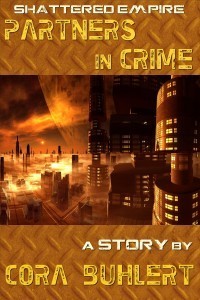 The Premier Imperial Bank of Houshou is the financial institute of choice for the rich and the crooked of the Fifth Human Empire. The bank boosts a two thousand year history of excellent but discreet service and its vaults and computers are thought to be impenetrable.
The Premier Imperial Bank of Houshou is the financial institute of choice for the rich and the crooked of the Fifth Human Empire. The bank boosts a two thousand year history of excellent but discreet service and its vaults and computers are thought to be impenetrable.
However, the Premier Imperial Bank of Houshou has not counted on Ethan Summerton and Holly di Marco, ex-aristocrat and ex-mercenary respectively, finding a way to breach its impenetrable security system and redirect the ill-gotten gains stored at the bank to the coffers of the Galactic Rebellion.
On the other hand, Holly and Ethan, whose murdered family was among the select clientele of the bank, have not counted on the Premier Imperial Bank of Houshou‘s rather eccentric idea of good customer service.
For more information, visit the Partners in Crime page.
Buy it for the low price of 3.99 USD, EUR or 2.99 GBP
at Amazon US, Amazon UK, Amazon Germany, Amazon France, Amazon Netherlands, Amazon Spain, Amazon Italy, Amazon Canada, Amazon Australia, Amazon Brazil, Amazon Japan, Amazon India, Amazon Mexico, Kobo, Barnes & Noble, Apple iTunes, Scribd, Oyster, Smashwords, Inktera, txtr, Thalia, Weltbild, Hugendubel, Der Club, Libiro, Nook UK, DriveThruFiction, OmniLit/AllRomance e-books, Casa del Libro, Flipkart, e-Sentral, You Heart Books and XinXii.
 Send to Kindle
Send to Kindle
February 1, 2015
1965 Wedding Photos
My parents are celebrating their golden wedding anniversary this year and I was drafted to design the invitations. And just in case you’re wondering, no, I’m not that old. My parents had already been married for several years when they had me.
In order to design the invitations, I also had to scan in some wedding photos. I can’t share the invitations yet, because my parents are paranoid about gatecrashers, but here are some wedding photos from 1965:

This photo was taken after the civil wedding. The suit is boring, but check out my Mom’s marvellous beehive hairdo, which supposedly took hours to do. The location seems to be the same building that still serves as the Bremen registry office 50 years later.
Here is a contemporary photo of the registry office.
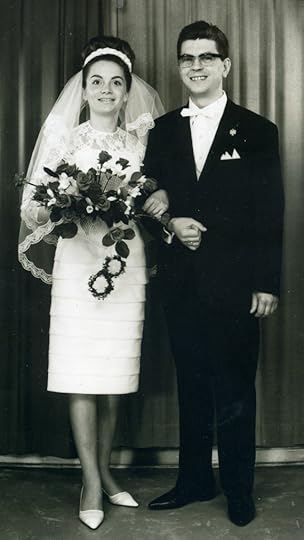
And here is the official wedding portait. That marvellous beehive is back. The bouquet is quite interesting as well. According to my Mom, the dangling eight-shape were two small myrtle wreaths, myrtle being the traditional choice for wedding wreaths and bouquets in Germany.
My Mom told me that she modelled her hairstyle after the style that Princess Margaret had worn at her wedding to Lord Snowdon in 1960. Now Princess Margaret was certainly a breathtaking bride, though personally I don’t see many similarities beyond the beehive. And Princess Margaret’s looks more like a Modesty Blaise type topknot than a beehive.
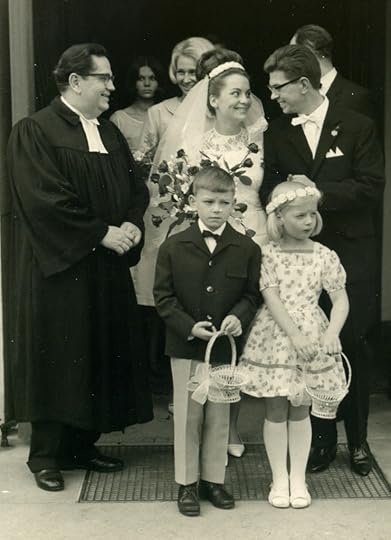
The newly-weds are leaving the church. Mom and Dad seem happy enough, as do the blonde bridesmaid and the jolly looking priest. The two flower kids look considerably less than happy, as does the dark-haired bridesmaid.
This is the church in question BTW. The flower girl is my cousin Ulrike (who once told me she was a flower girl all the time and always had to wear the same dress), the flower boy was a neighbour’s kid named Joachim. The smiling blonde bridesmaid (Doesn’t she look just like Betty Draper? – shudder) is married to a cousin of my Mom. As for the darkhaired bridesmaid, no one even remembers her name. Apparently, she was the girlfriend of the best man or something and they broke up not long thereafter.
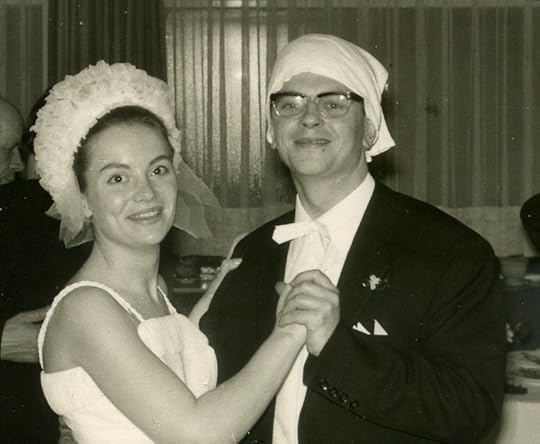
At midnight on your wedding day, they made you take off your veil and wear a nightcap instead. My Mom’s looks more like a swimming cap though, probably to accomodate the beehive. My Dad looks very silly and about twelve.
I have no idea what the reasoning behind the nightcap custom is, though it seems creepily reminiscent of relatives making sure you’re properly celebrating your wedding night. The nightcap is usually preceded by the bride having her veil literally ripped to shreds by the other guests for good luck. The veil ripping and nightcap wearing custom seems to have largely died out, because the brides hate it. Good riddance IMO, because it is a weird custom.
 Send to Kindle
Send to Kindle
January 30, 2015
Indie Speculative Fiction of the Month for January 2015
 It’s that time of the month again, time for “Indie Speculative Fiction of the Month”.
It’s that time of the month again, time for “Indie Speculative Fiction of the Month”.
So what is “Indie Speculative Fiction of the Month”? It’s a round-up of speculative fiction by indie authors newly published this month, though some December books I missed the last time around snuck in as well. The books are arranged in alphabetical order by author. So far, most links only go to Amazon.com, though I may add other retailers for future editions.
January 2015 actually marks the one year anniversary of “Indie Speculative Fiction of the Month”, because we started out in January 2014 with 12 newly released SFF titles. One year on, we have 35 new release, covering the whole broad spectrum of speculative fiction. We have hard science fiction, military science fiction, space opera, science fiction romance, paranormal romance, Steampunk, dystopian fiction, post-apocalyptic fiction, weird western, epic fantasy, urban fantasy, Arthurian fantasy, Asian based fantasy, young adult fantasy, SFnal fairytales, tiem travel, werewolves, vampires, superheroes, magic schools, sirens, super-mathematicians, rogue AIs, warlock hunters and much more. Once again, we also have a broad spectrum of authors hailing from countries as diverse as the US, UK, Canada, Australia, France, Cambodia, Malaysia, Singapore and Kuwait.
Don’t forget that Indie Speculative Fiction of the Month is also crossposted to the Speculative Fiction Showcase, a group blog run by Jessica Rydill and myself, which features new release spotlights, guest posts, interviews and link round-ups regarding all things speculative fiction several times per week.
As always, I know the authors at least vaguely, but I haven’t read all of the books, so Caveat emptor.
And now on to the books without further ado:
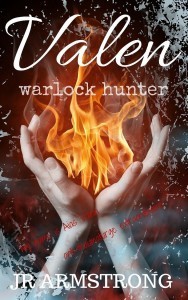 Valen: Warlock Hunter by J.R. Armstrong
Valen: Warlock Hunter by J.R. Armstrong
Assan, the greatest city in the known world.
Recently the Mage Wars have been tearing the city apart, but for warlock hunter Aias Valen, the underworld battles that rage through the streets mean coin in her purse, and an opportunity to settle old scores.
As the crime lords pay handsomely for her services, the mages find themselves face to face with their greatest fear – an anti-thaumaturge, a being whose very presence means a quick death to any magic. But Aias’s old enmities continue to push her further into danger. And when someone pushes back, she will find there are greater dangers in Assan than the crime lords.
In politics, is there a place for love?
Van Motaff, renowned philosopher and Rahfonist, is looking ahead to Retirement, but the planetary government has other plans. Something unprecedented has happened—a young, male Rahfoni has been raised by aliens for the past thirty years—and Van has been chosen to restore him to Rahfon society.
Even though the eyes of two worlds are on her, Van thinks the job will be straightforward enough. But when her charge, Eton Abless, is injured, an irate governor interferes, demanding that the young man be neutralised as a potential political threat. Van resists and finds herself falling into a forbidden romance with her student…a romance that may mean the end of her reputation and career, and his permanent exile. As her options narrow, Van is forced to face the conclusion that the only way to save Eton may be to lose him completely.
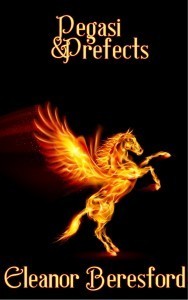 Pegasi and Prefects by Eleanor Beresford
Pegasi and Prefects by Eleanor Beresford
Charley’s final year at Fernleigh Manor is complicated by a runaway pegasus, unwanted Games Captainship, a dangerous new rival and, most of all, falling head over heels in love with another girl. What is a reluctant Senior Prefect to do?
A magical YA school story with a sapphic twist, the first in the Scholars and Sorcery series.
Scholars and Sorcery is a series of young adult fantasy novels set in an alternate version of 1950s England in which elves invaded in the far past, leaving magic and mythical creatures such as fairies and dragons behind them. It features lesbian heroines and a sweet dollop of romance.
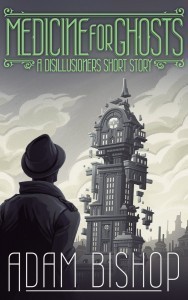 Medicine for Ghosts by Adam Bishop
Medicine for Ghosts by Adam Bishop
It isn’t unusual for an investigative reporter like Jarvis to hear rumours, but a rumour about prisoners who aren’t supposed to exist? Well, that’s another matter entirely. A mysterious, unsigned letter brings Jarvis to the military border town of Daruma with a promise that the story waiting for him there will be a blockbuster. For a young reporter trying to make a name for himself, the appeal is too great to resist. But what Jarvis discovers in Daruma will force him to weigh his duty as a reporter against his obligations as a citizen. What can he, a solitary reporter, do to make his country a better place to live?
Medicine For Ghosts is a short story prequel to the full-length novel The Disillusioners.
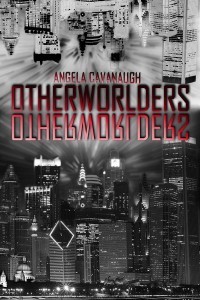 Otherworlders by Angela Cavanaugh
Otherworlders by Angela Cavanaugh
When a virus threatens humanity with extinction, the desperate and dwindling number of uninfected seek refuge in a parallel universe. The technology is untested. The other universe is unprepared and one thing is made violently clear: they are not wanted.
As a weaponized, fatal virus mutates and threatens to kill all life forms on Earth, Special Agent Williams and the government conspires to send the healthy away. After space travel and going underground are ruled impossible, all that remains is the theoretical technology of an autistic savant: escaping to a parallel universe. But when they travel to the other dimension, their arrival is met with suspicion and hatred. To evade persecution, experimentation, and to save their lives, the Otherworlders must find a way to escape, survive, and outwit Agent Williams’s murderous double.
 Xiao Xiao and the Dragon Pearl by Joyce Chng
Xiao Xiao and the Dragon Pearl by Joyce Chng
Enter the world of Xiao Xiao, daughter of an imperial courtesan, and a fantastical historical Qing China, with dragons and magic and traditions. What happens when her mother adopts a baby girl found in a rice field? What does – can – the green pearl do?
It’s a new generation of royal vampires.
Alexis’ daughter Eylin is nearly grown, in the beginning of her transformation. Born with the mark of the dragon and placed under a spell as in infant, the young princess finds herself in the middle of an age-old battle between mortal enemies.
Eylin starts to fall for the son of their enemy: the one who kidnapped Eylin years earlier. Pulled between the ties of family and romance, she must decide between two different worlds. Depending on the decision she makes, someone will end up sacrificing their life.
This is book 6 of The Transformed series.
Being a lone wolf could be Riley’s greatest strength, or her greatest weakness…
After surviving her psychotic ex-boyfriend’s quest for revenge, Riley Cray was ready to settle back into her quiet life and fade into obscurity. The Shepherd of the City, Alexei Cordova, however, has other plans for the lone werewolf. Someone is murdering supernaturals under the master vampire’s protection, and he wants Riley to figure out why.
Relying on the help of her friends and her paltry knowledge of the supernatural world, can Riley discover who the murderer is before Denver is consumed by a war between vampires and werewolves?
Watch out. This bitch bites!
This is the sequel to Hunted.
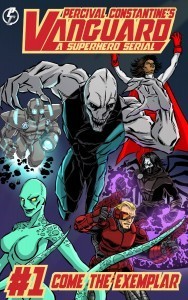 Vanguard No.1: Come the Exemplar by Percival Constantine
Vanguard No.1: Come the Exemplar by Percival Constantine
Witness the birth of heroes!
The world has changed. A mysterious event altered the genetic structure of humanity, granting a small percentage of the population superhuman powers. The government has secretly formed a superhero team to deal with threats from potential supervillains. Paragon—telekinetic powerhouse; Zenith—hyper-intelligent AI; Shift—shape-changing teenager; Wraith—teleporting shadow warrior; Sharkskin—human/shark hybrid. Led by the armored Gunsmith, they are Vanguard!
Callum King’s life has fallen apart. He lost his job, his wife left him, and he was about to end it all—when he discovered he possessed the powers of a superman. Now calling himself the Exemplar, he’s declared himself the world’s first superhero, out to prove those who doubted him wrong. But his arrogance far supersedes his good intentions! Can Vanguard overcome their internal strife in order to face their first threat?
From Percival Constantine comes an all-new team of superheroes in the vein of the X-Men and the Avengers!
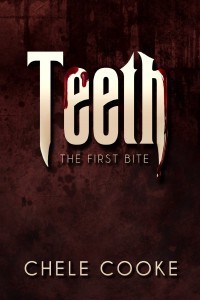 Teeth: The First Bite by Chele Cooke
Teeth: The First Bite by Chele Cooke
Medical intern Thomas awakes in a blood-drenched basement and the realisation that his life must change forever. After all, how can he practise medicine when the smell of blood turns him into a vicious killer?
Spencer thinks being a vampire is better than any teen movie made it out to be. Now he must train Thomas and make his mentor proud.
One mistake risks more than either are willing to lose, and a single broken law could turn them from predators to prey.
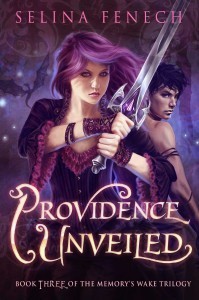 Providence Unveiled by Selina Fenech
Providence Unveiled by Selina Fenech
Just when she is finding herself, Memory is about to lose everything. Home, friendship, family, goals, love… Memory will break all the rules to try and save what is important to her, but her actions are being manipulated by a dark force toward a dark end. Worlds will be broken, love will be stolen, and sacrifices will be made.
In this final novel of the Memory’s Wake trilogy, following Memory’s Wake and Hope’s Reign, the truth will be unveiled.
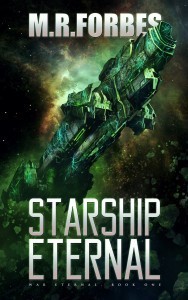 Starship Eternal by M.R. Forbes
Starship Eternal by M.R. Forbes
A lost starship…
A dire warning from futures past…
A desperate search for salvation…
Captain Mitchell “Ares” Williams is a Space Marine and the hero of the Battle for Liberty, whose Shot Heard ‘Round the Universe saved the planet from a nearly unstoppable war machine. He’s handsome, charismatic, and the perfect poster boy to help the military drive enlistment. Pulled from the war and thrown into the spotlight, he’s as efficient at charming the media and bedding beautiful celebrities as he was at shooting down enemy starfighters.
After an assassination attempt leaves Mitchell critically wounded, he begins to suffer from strange hallucinations that carry a chilling and oddly familiar warning:
They are coming. Find the Goliath or humankind will be destroyed.
Convinced that the visions are a side-effect of his injuries, he tries to ignore them, only to learn that he may not be as crazy as he thinks. The enemy is real and closer than he imagined, and they’ll do whatever it takes to prevent him from rediscovering the centuries lost starship.
Narrowly escaping capture, out of time and out of air, Mitchell lands at the mercy of the Riggers – a ragtag crew of former commandos who patrol the lawless outer reaches of the galaxy. Guided by a captain with a reputation for cold-blooded murder, they’re dangerous, immoral, and possibly insane.
They may also be humanity’s last hope for survival in a war that has raged beyond eternity.
“Magick ain’t pretty, it ain’t stars and sparkles. Magick is dirty. It’s rough. Raw. It’s blood and guts and vomit. You hear me?”
When Prime Lord Hark is found in a pool of his own blood on the steps of his halls, Tonmerion Hark finds his world not only turned upside down, but inside out. His father’s last will and testament forces him west across the Iron Ocean, to the very brink of the Endless Land and all civilisation. They call it Wyoming.
This is a story of murder and family.
In the dusty frontier town of Fell Falls, there is no silverware, no servants, no plush velvet nor towering spires. Only dust, danger, and the railway. Tonmerion has only one friend to help him escape the torturous heat and unravel his father’s murder. A faerie named Rhin. A twelve-inch tall outcast of his own kind.
This is a story of blood and magick.
But there are darker things at work in Fell Falls, and not just the railwraiths or the savages. Secrets lurk in Tonmerion’s bloodline. Secrets that will redefine this young Hark.
This is a story of the edge of the world.
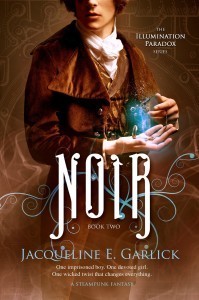 Noir: A Steampunk Fantasy by Jacqueline Garlick
Noir: A Steampunk Fantasy by Jacqueline Garlick
With Urlick (Babbit) imprisoned, awaiting execution for the alleged murder of Professor Smrt, Eyelet (Elsworth) must find her way back through the criminal infested woods, among the blood-thirsty Infirmed, to the forbidden city of Brethren, in time to free him from his fate.
With the help of Crazy Legs, Eyelet overthrows a travelling freak show train on its way into Brethren, planning to use the train to distract the city long enough to free Urlick. Just as they think their luck is about to hold, Eyelet is lured astray by an image from her past. Entering an abandoned factory at the city’s edge, she unearths a series of ungodly secrets, and soon finds herself imprisoned.
With Urlick locked away in the Stone Jug and Eyelet on her way to MadHouse Brink, will C.L. be able to spring both loose in time to save the day? Or will he too, fall prey to the torturous mind of Brethren’s newest Ruler—who is, in fact, a self-appointed heir to the throne.
It appears there is an heir that’s been overlooked. An heir the new ruler is determined to keep secret.
Noir is book 2 of the Illumination Paradox series and sequel to Lumiere.
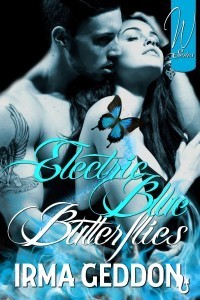 Electric Blue Butterflies by Irma Geddon
Electric Blue Butterflies by Irma Geddon
He’s been in love with her since they were children. She thinks she’s getting married to a complete stranger.
When the wedding night ends in tragedy, the only thing two lovers need is to trust that LOVE KNOWS NO LIMIT—not even death.
—–
Constance has always known her parents would choose a husband for her when she would be old enough to get married—this is part of a long tradition in her family, one she has decided not to fight despite her powerful need for freedom.
When she meets William, her future husband, just one day before the wedding, she falls for him on the spot. He is strikingly handsome, he’s a succesful business man, but most of all, he is completely under her spell and looks at her like she’s hung the moon.
William is killed in a horrible animal attack during the wedding party, before he can be alone and confide in Constance. Trying to cope with the sudden death of her husband, Constance will unearth all of William’s secrets. But, as it turns out, William isn’t gone for good.
Time is running out for William and Constance’s love story—will she find a way to get back the husband she didn’t know she wanted so much?
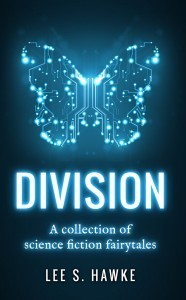 Division: A Collection of Science Fiction Fairytales by Lee S. Hawke
Division: A Collection of Science Fiction Fairytales by Lee S. Hawke
From LEE S. HAWKE, author of “The Changeling and the Sun” (published by Ideomancer Speculative Fiction Magazine) comes DIVISION: A COLLECTION OF SCIENCE FICTION FAIRYTALES.
Featuring 7 original, fairytale-inspired science fiction short stories, this collection explores the division between mind, body, technology and humanity.
Includes:
A chronically ill civilian discovers that his immune system may be the key to human survival
A schoolgirl tries to escape her demons through levels of virtual reality
A data analyst falls in love with a software coder during a forced government assignment
A young boy is confronted with a horrifying truth about his constructed world
A jaded medical technician rediscovers the meaning of beauty
A girl scrambles to escape a horrifying alien invasion in a futuristic dystopia, and
A spaceship engineer struggles with the death of her only daughter.
Cas Russell is back — and so is her deadly supermath.
Cas may be an antisocial mercenary who uses her instant calculating skills to mow down enemies, but she’s trying hard to build up a handful of morals. So when she’s hired by an anguished father to rescue his kid from an evil tech conglomerate, it seems like the perfect job to use for ethics practice.
Then she finds her client’s daughter… who is a robot.
The researchers who own the ’bot will stop at nothing to get it back, but the kid’s just real enough for Cas to want to protect her — even though she knows she’s risking everything for a collection of metal and wires. But when the case blows up in her face, it plunges Cas into the crossfire of a massive, decades-long corporate espionage war.
Cas knows logically that she isn’t saving a child. She’s stealing a piece of technology, one expensive and high-stakes enough that spiriting it away is going to get innocent people killed. But she has a distraught father on one hand and a robot programmed to act like a distraught daughter on the other, and she’s never been able to sit by when a kid is in trouble — even a fake one.
Screw morals and ethics. All Cas wants to do is save one little girl.
This is the sequel to Zero Sum Game.
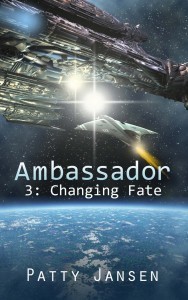 Ambassador 3: Changing Fate by Patty Jansen
Ambassador 3: Changing Fate by Patty Jansen
Fifty thousand years ago, a meteorite hit the planet Asto, giving its Aghyrian inhabitants mere days of notice. Three ships escaped the Armageddon. Two went to the neighbouring planet. The third, a massive generation ship, refused to take on refugees, and then vanished without a trace.
It’s coming back.
Its initial burst of communication caused the outage of the Exchange, the FTL network for transport and communication, but since then the ship has been silent. It jumps about at random, using wormholes it generates with a drive the likes of which no one has seen before.
Meanwhile at the gamra assembly, people jostle to be in the best positions when it inevitably turns up in inhabited space. What the ship wants or whether there is anyone on board no one knows, but diplomat Cory Wilson knows one thing: when it turns up, he must avoid a conflict at all cost.
If only gamra presented a united viewpoint. If only Asto’s army wasn’t keen to get involved. If only the Aghyrians at gamra didn’t do what they do best: manipulate and play games with everyone. While the ship approaches, the delegates bicker, and the time for negotiating is fast running out.
This is book 3 of the Ambassador series, following Seeing Red and Raising Hell.
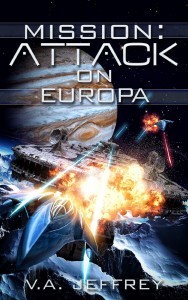 Mission: Attack on Europa by V.A. Jeffrey
Mission: Attack on Europa by V.A. Jeffrey
The affair on Langrenus now settled, Bob plans to return home. But an urgent cry for help from an old friend interrupts his homecoming. The Big Boss sends him a fleet of newly built fighter ships, seemingly just in time for this new and unexpected mission. Bob brings along a new ally, enlisting him in his growing little band of U-net agents. The new guy is James Jenkins, a.k.a Diamond Dog, a young, hot-shot pilot with smuggling connections and as soon as they set foot on Mars trouble blows up in their faces.
A new city is being built and there will be a final gathering of the Allied Martian Powers. They’ve been planning their long-awaited and perilous mission – to destroy the loyalist alien military base on Europa. Bob and Diamond bring along much needed help to the cause, more than willing to rally to the side of the Alliance of Martian Powers but Bob finds that things are changing faster than he can keep up with and his experience in Langrenus haunts him in more ways than one. On Mars, alliances between humans and aliens are complex, tenuous things and Bob finds that even relationships with one’s allies can be uneasy.
This is book 3 of the Mission series, following Flight to Mars and Lights of Langrenus.
Corina Marion’s father is dead.
Off to a never-ending war as a Red Cross doctor before Corina was even born, Luther Marion has been a constant but increasingly distant presence in his daughter’s life for sixteen years. Damaged pictures. Short letters. And three brief phone calls received before Corina was old enough to walk.
But now, Luther Marion has returned home at last—as a body in a box to be buried. Corina’s mother is devastated. Her small, backwoods town mourns the loss of its local hero.
And Corina…isn’t sure how she feels about the death of a father she never really met.
But when a mysterious old man confronts Corina at her father’s funeral, she finds herself drawn to his impossible offer: a chance to know the now late Luther Marion. And in a moment of uncertainty, Corina makes a choice with consequences she can barely fathom. A choice that sends her to the last place she ever expected to go.
Her father’s hometown. Six hundred miles south.
And twenty-five years in the past.
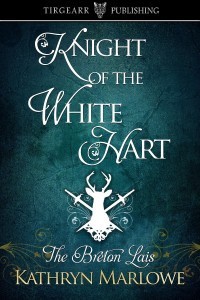 Knight of the White Hart by Kathryn Marlowe
Knight of the White Hart by Kathryn Marlowe
Guigemar is a Breton knight who fights alongside King Arthur. His excels in all the courtly arts, save one: he has always scorned love.
Returning home, the knight goes hunting with a friend and shoots a white deer. The arrow bounces back to wound him, too. The doe curses him: the wound will never heal until he meets a woman who will love him truly and suffer for that love like no one ever has ever suffered before.
Mad with pain, he stumbles to the shore where a stunning ship sails him away, despite lacking a crew. He tosses and turns in fevered dreams until he awakes to find the most beautiful woman he has ever seen peering in at him.
And there his real troubles begin.
The Middle Ages: when ‘romance’ meant adventure!
A thousand years after travelling into space, humans have spread across the Milky Way. Ancient platforms maintain stable wormholes, allowing rapid travel between planets tens of thousands of light-years apart. In a union of systems spanning thousands of habitable worlds, huge interstellar companies operate to exploit resources in remote corners of the galaxy.
Segue is a planet on the outer borders of human controlled space, with vast tropical continents covered in steaming jungle, far away from the laws of civilization. Company agent Ves arrives on Segue with a mission to find a missing company manager, and discover how a valuable export is being contaminated. A dangerous boat journey takes her into the dark interior to find answers.
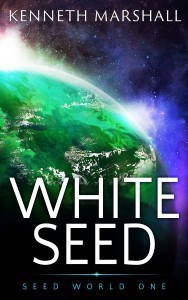 White Seed by Kenneth Marshall
White Seed by Kenneth Marshall
The White Seed Brings Life to Worlds
Three thousand years ago, the seeds arrived from Earth on hundreds of worlds. The developed ones formed the Network, connected only by radio and laser. Since the time of the seeds, nothing but information has traveled between the stars. Now a starship, The Child of Ambition, is changing that. Her first mission: to explore the dark worlds, the ones that failed.
Kali Hakoian, pilot-astronaut and war hero, thought landing on the super-Earth of Keto would be routine. The emptiest seed world—its global ocean matted with algae and crawling with hurricanes—hides the oldest human ruins. Her crew of scientists: a dreamer, a believer, and a retired assassin. Their hypothesis—self-termination of the seed base.
But when an act of sabotage strands her in the path of a superstorm, she’s forced to escape with the man she trusts the least. They may never find out what happened to the settlers—unless it happens to them. Can she trust her crew enough to find a way out of the darkness?
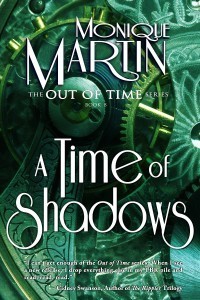 A Time of Shadows by Monique Martin
A Time of Shadows by Monique Martin
It’s been a few months since Simon and Elizabeth returned from their adventure in 1888 London. Jack is back with them and all is as it should be, until a knock on the door changes that. A visitor from the future turns their world upside-down.
Unable to return her to her time, they go to the Council for help, only to discover there are bigger problems afoot. All of the watches have been shut down until a dangerous and secret weapon–a watch that can change any point in time–can be found. Too powerful for anyone to possess, it was hidden. But now the secret’s out, and the mysterious Shadow Council will do anything to get their hands on it.
Simon, Elizabeth and Jack race to find it before the Shadow Council does or it will be the end of…everything.
This is book 8 in the Out of Time series.
When unquiet ghosts walk the earth, the servants of Atenas, God of Death, guide them to their final rest in His domain. For six years, Zerafine, priestess of Atenas, and her companion Gerrard have walked the known world, bringing peace to the dead and fair judgment to the living. Hated and feared as a death-bringer by many, Zerafine has never regretted her decision to serve Atenas and never doubted her ability to carry out His will.
Until now.
An unexpected assignment from the Archpriest of Atenas sends Zerafine and Gerrard to Portena, the oldest city in the world, in pursuit of a kind of ghost no one has ever seen before: spirits that vanish before they can be sent to Atenas’s court, appearing and reappearing at random. As emissary of Atenas, Zerafine’s task is to discover the true nature of these ghosts and find a way to bring them peace. But Zerafine’s assignment puts her at odds not only with the rulers of Portena, but with the high priest of another God, and she soon realizes that all is not as it seems in the great city. If Zerafine fails to learn the truth and put these ghosts to rest, it could mean disaster not only for Portena, but for the world.
Siren Talbot’s life is plagued with storms. Her mother’s insanity was the first, though not the last. Called to the ocean, not even the shores of Edisto Island can calm the tempest inside her.
Though she’s settled into a life with Patrick, his promises of a happily ever after can’t still the foul weather of her past or the brewing squall on the horizon. She’s haunted by the disappearance of her first love, Carver, and the lack of answers.
A single clue unlocks mysteries she can’t explain. A murder cements the impossible as possible. The more magic she uncovers, the darker her suspicions become and the more the hurricane inside her starts to rage.
Patrick isn’t the Prince Charming he claims to be.
And he knows exactly what happened to Carver.
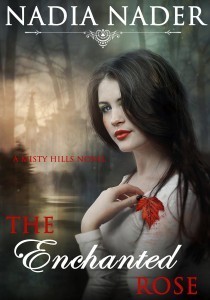 The Enchanted Rose by Nadia Nader
The Enchanted Rose by Nadia Nader
When Vivian’s mother dies in a tragic accident, Vivian’s world is turned upside down. Her life, as she knows it, is over. A new life, full of her mother’s secrets, begins…
Sent away by her father to live with two eccentric aunts on the mysterious Tremaine Estate, Vivian comes to learn that a powerful curse lurks over her family – one that only she may have the power to break. With each day she spends in Misty Hills, Vivian uncovers more unsettling discoveries about the town, her reclusive family, and herself.
Can Vivian let go of every truth she’s ever believed and discover who she really is, before the dark secrets hidden within the supernatural town threaten to consume her and those she loves?
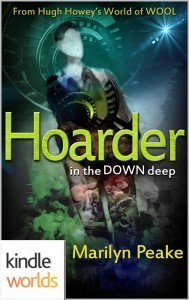 Hoarder in the Down Deep by Marilyn Peake
Hoarder in the Down Deep by Marilyn Peake
It’s against the law to have children without winning the lottery. Implanted with a birth control device as required by law, Evangeline Hubbard, a dirt farmer in the down deep, discovers that implants sometimes fail. But in a world strictly controlled by the authorities, one pays a terrible price for tampering with the established order. Consumed by fear and madness after things go horribly wrong, Evangeline hoards in order to hang onto things. She adds them to the nest she’s building in the down deep.
HOARDER IN THE DOWN DEEP is a novella based on the best-selling WOOL series by Hugh Howey, and was written with his permission. It’s set in the time when Sheriff Holston and his wife Allison had won the lottery, giving them one year to conceive a child. Investigating the case of Evangeline Hubbard, Sheriff Holston and Mayor Jahns are unprepared for what they find. HOARDER IN THE DOWN DEEP explores how psychological issues and emotional pain can lead to hoarding. It also explores the mental strain placed on women who have lost control over their own reproductive processes.
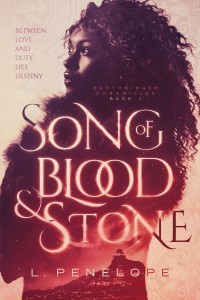 Song of Blood and Stone by L. Penelope
Song of Blood and Stone by L. Penelope
Between love and duty lies destiny
Orphaned and alone, Jasminda is an outcast in her homeland of Elsira, where she is feared for both the shade of her skin and her magical abilities. When ruthless soldiers seek refuge in her isolated cabin, they bring with them a captive – an injured spy who steals her heart.
Jack’s mission behind enemy lines nearly cost him his life but he is saved by the healing power of a mysterious young woman. Together they embark on a perilous journey straight into the heart of a centuries-old conflict.
Thrust into a hostile society, Jasminda and Jack must rely on one another even as secrets jeopardize their bond. As an ancient evil gains power, Jasminda races to unlock a mystery that promises salvation.
The fates of two nations hang in the balance as Jasminda and Jack must choose between love and duty to fulfill their destinies and end the war.
This adult fantasy romance is recommended for readers 17 and older.
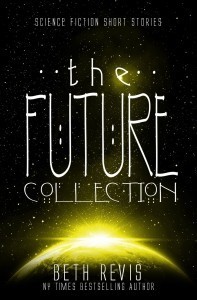 The Future Collection by Beth Revis
The Future Collection by Beth Revis
This collection of short stories by New York Times bestselling author Beth Revis features science fiction tales about the future.
DOCTOR-PATIENT CONFIDENTIALITY: A young woman wakes up in a cryomed ward of a hospital. As she recalls what led to her confinement, she starts to realize just what the consequences of her actions were, and how much time has passed since she was injured.
THE MOST PRECIOUS MEMORY: In a world where memories can be bought and sold as highly addictive drugs, one transaction takes an unusual turn. *Note*: this story was previously published in the Soothe The Savage Beast anthology.
THE GIRL AND THE MACHINE: A man has limited abilities to travel through time, but a cute girl pops up in his life, informing him that her time machine can open the door to far greater powers. But there’s something ominous about it… *Note*: This story is available as an individual short in Amazon.
LAG: A reporter had been chasing down a lead…but after a malfunction in the teleporter she used, she’s forgotten what the lead was. Now she’s searching for clues in her own life to discover what it was she’s missing.
THE TURING TEST: A college student participates in a turing test to see if she can distinguish which of the two subjects is human and which is an android. *Note:* A version of this story is a part of the Special Edition of THE BODY ELECTRIC novel and was previously published in Lightspeed Magazine.
AS THEY SLIP AWAY: A group of artists on a generation space ship that reviles art is given a unique assignment, one that draws one young lady far too close to a possessive man protected by the ship’s government. *Note:* This short story is available free online and is linked to the ACROSS THE UNIVERSE world.
Her decisions are final, her justice swift, her tolerance of those who would risk the fragile peace is zero.
RIGA,AI is a new kind of heroine set in a future where AIs and humans live alongside each other in a fragile peace. RIGA is a non-human but there is much about her that is unknown, even to her. Her unique composition means RIGA is often ‘the hunted’ in an increasingly dangerous universe where humans, transhumans and artificial intelligence all struggle to survive together.
RIGA’s unique skills make her extremely valuable to the Emporium’s secret service, the ESSG. Trained in the roles of Diplomat, Assassin and Spy, means she has to rely on her unique abilities to keep her alive and one step ahead of her enemies. But, the enemy has plans and RIGA is in their way.
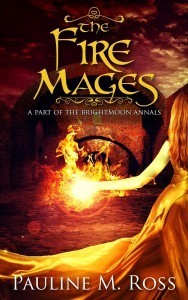 The Fire Mages by Pauline M. Ross
The Fire Mages by Pauline M. Ross
Kyra has always been drawn to the magic of spellpages. She is determined to leave her small village far behind and become a scribe, wielding the power of magic through her pen. Halfway through her training, she has a mage as patron and her ambitions are within her grasp. But a simple favour for her sister goes disastrously awry, destroying Kyra’s dreams in an instant.
Devastated, she accepts an offer from a stranger to help her find out what went wrong. The young man sees growing power within Kyra, potentially stronger than spellpages or any living mage. The answers to unlocking that power may lie within the glowing walls of the Imperial City, but its magic is strong and the unwary vanish without trace on its streets. Thirsty for knowledge and desperate to avoid another accident, she feels compelled to risk it.
While she focuses on controlling her abilities, a storm of greed and ambition boils up around her. Kyra is a pawn in the struggle for dominance between unscrupulous factions vying for rule of her country. Trusting the wrong side could get her killed–or worse, the potent magic she barely understands could be put to unthinkable evil.
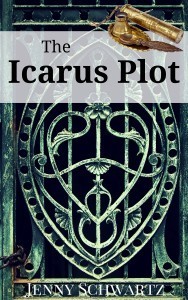 The Icarus Plot by Jenny Schwartz
The Icarus Plot by Jenny Schwartz
Ivana March runs a very special toy shop in the heart of Victorian London. The last person she expects to see enter it is an earl. Not that she has time to entertain him. Someone is stealing children, and the street kids whisper tales of a “Metal Man”. Ivana must find the monster, rescue the children, and if the earl really wants to help, he can come with her. Only, no one warned her she’d have to venture to places better left unexplored. A good thing, then, that the new Earl of Somer is a noted explorer. When the two of them join forces, what could possibly go wrong?
A short Steampunk novella
He had left that life behind, sworn he would never return to it. He had a new life—a wife, a daughter. He was happy. But in a wretched twist of events, he finds himself forced to reclaim what he once was in order to save those who are most precious to him. Or else…
The Null is a short superhero thriller that would cover approximately 20-25 pages in a traditional paperback.
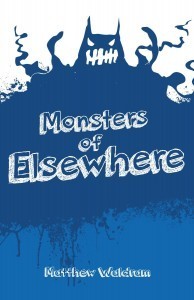 Monsters of Elsewhere by Matthew Waldram
Monsters of Elsewhere by Matthew Waldram
There is a land – let’s call it Elsewhere – that is in no small amount of trouble. Giant wolves are tearing villages apart, a monster king is bringing his army across the sea to capture the legendary Hall of Glass, and the High Lord has completely disappeared.
Henry Whistler was eight when he got lost at a bus station in Hounslow. There his adventure began. For that was when he met the exiled invisible man, the monster swordsman, and the girl with the bright red hair.
Now a grown-up, Henry’s childhood adventure is a faded memory… until his fiancée vanishes. Until he is drawn into another world. Until he is pursued by a blind assassin – with only a monster and a dead man for company – across a land that is in no small amount of trouble.
 Send to Kindle
Send to Kindle
January 24, 2015
The “Is my book a romance?” flowchart
Because this question keeps popping up on writers forums and the like, here is a handy flowchart to answer the question “Is my book a romance?”
 Send to Kindle
Send to Kindle
Snow 2015
This morning, we had our first real snow of the winter, about two centimetres. It supposedly won’t last long, but it looked quite pretty. Shovelling it away was quite tiring though.
I wish I could go hiking today, but I don’t have the time. Maybe tomorrow, if we still have snow by then.
Meanwhile, enjoy these snowy photos I took in my neighbourhood:

Snow covered oak tree, meadow, neighbour houses and brand new garage.

Looking up my street.

Looking down my street. In the distance, you can see a neighbour shovelling snow.

Snowy driveway and neighbour house. The man living in that house eyed my camera quite suspiciously. He’s one of those people who always think the world is out to rob them.

Snowy driveway, mailbox, street and the butt-ugly houses they built across the road.
 Send to Kindle
Send to Kindle
Cora Buhlert's Blog
- Cora Buhlert's profile
- 14 followers




